FEATURE
THEIR FIRST WINTER CAMP
Camp Northern Lights through the eyes of one family
FIRST TIME CAMPER CONTINUES A FAMILY LEGACY
Even for a third-generation Warrenite, there’s still a first time at camp


COUNSELORS’ FIRST TIME MEMORIES
3 counselors share their experiences
Help us solve a mystery! See back cover YMCA of the North | ymcanorth.org SPRING 2024 ISSUE NO. 3
MAGAZINE
WE MIGHT BE OLD, BUT WE’RE NEW TOO
Many of our camps have been around for nearly 100 years (or more), but new program offerings are frequent. Here are some examples of the unique new initiatives that have been launched in the last few years.
WARREN
Week-long backpacking trip in the Boundary Waters, open to any camper who has completed a Short Border canoe trip.
MENOGYN
Partnership with the North House Folk School internship program to help maintain our wood-canvas canoe fleet.
IHDUHAPI
Y She Skis — a beginner level cross-country ski weekend for women.
ST. CROIX
Pizza Night — A large-scale community gathering at the farm, complete with music and ‘build your own’ pizza dinner.
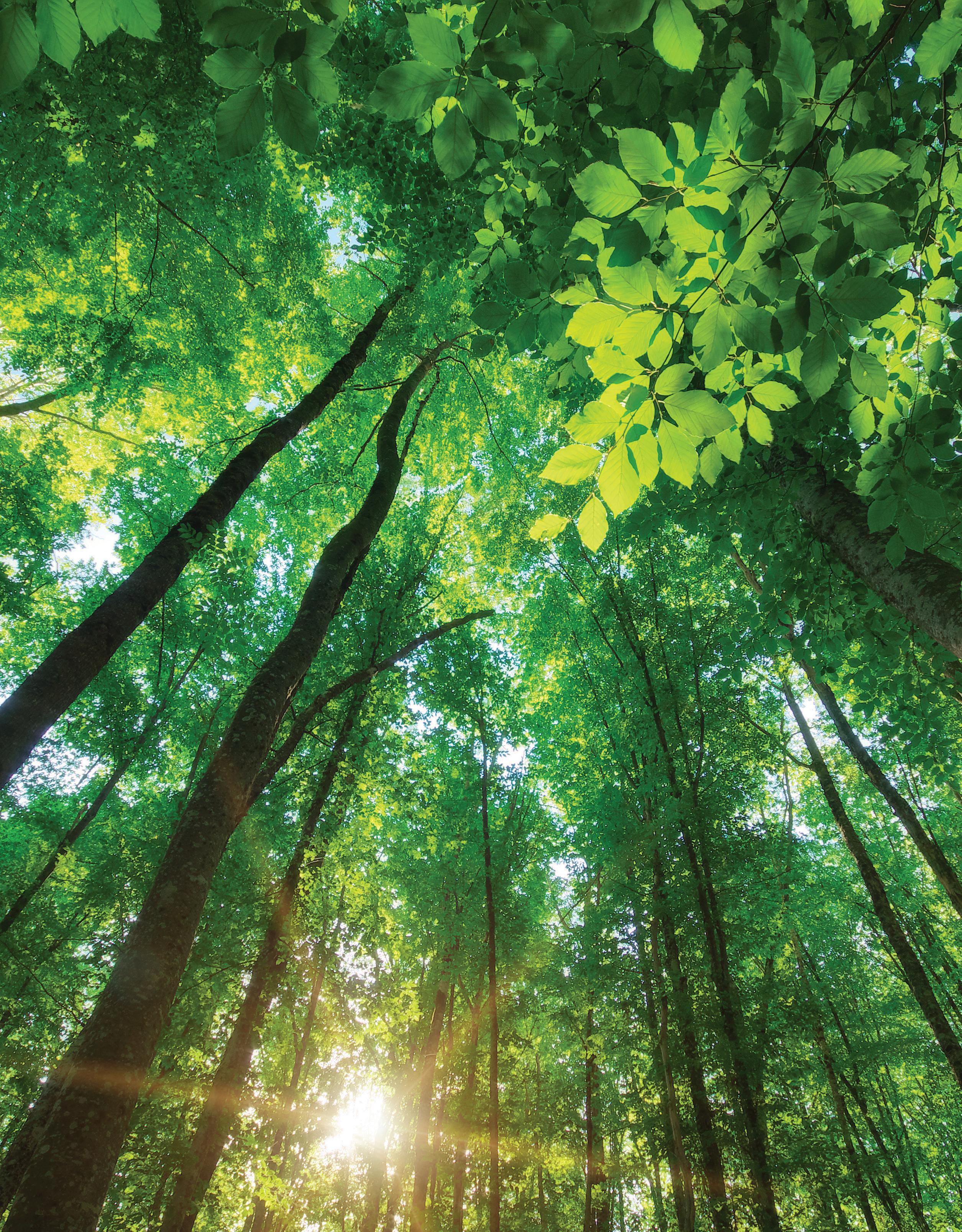
NORTHERN LIGHTS
Fat tire bike retreat — biking in the snow on the trails around camp.
ICAGHOWAN
Summer Mini Session —
The perfect way to “try out” camp for just a few days.
WIDJIWAGAN
Learn from our canoe shop expert and take home your own paddle.
DU NORD
All ages art weekend — all the camp crafts you can think of!
ymcanorth.org/adventure
EXPLORE WITH US
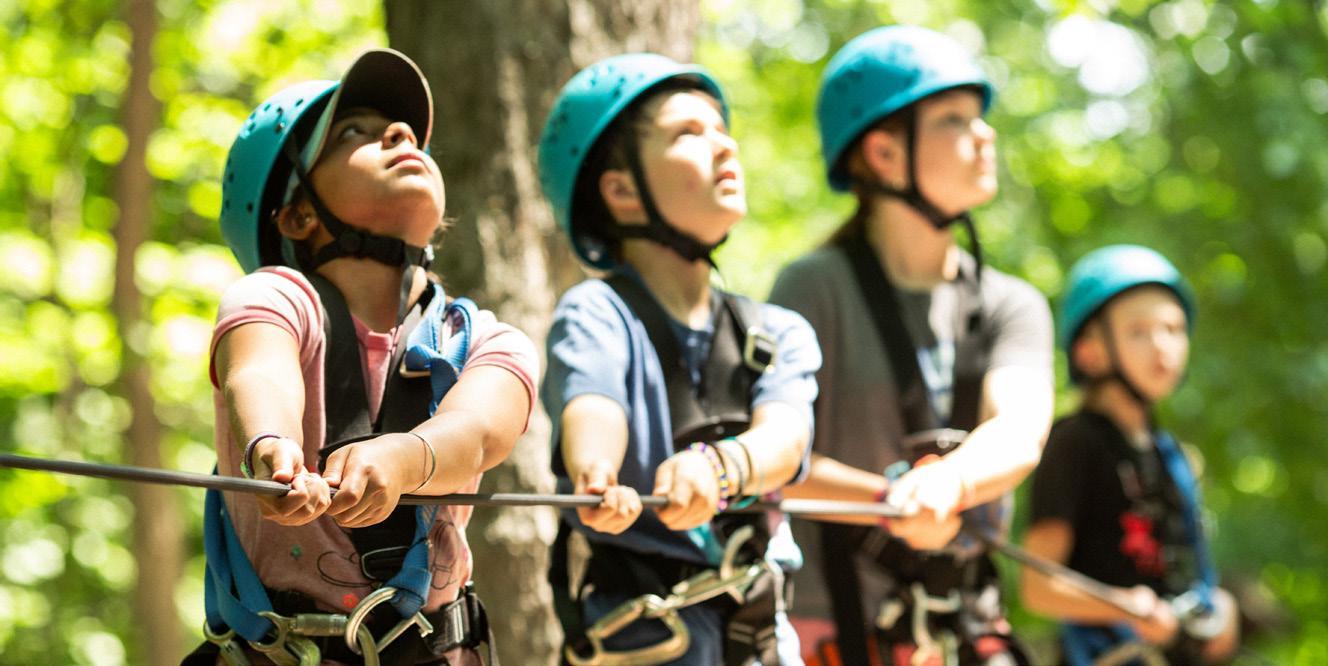

Contents Letter from the Editor Upcoming Events at Camp Camp Warren Camp Menogyn Camp Ihduhapi Camp St. Croix Camp Northern Lights Camp Icaghowan Camp du Nord Letters from Alumni Letter from the Vice President Many Hands Make Light Work 4 5 6 8 11 14 16 20 26 28 30 31 First time camper continues a family legacy Leading a wave of change Ihduhapi’s first-time counselors’ first time memories The way nature nurtures Their first winter camp That time Icaghowan forgot its own birthday The sweat that binds us Camp Gathering Pines 25 The first summer of Gathering Pines Camp Widjiwagan 22 Widji led to the ‘most interesting places’
Letter from the

When I was a camp director, the bathhouse was a little chaotic on the first night of every new session. I was always on hand to help out and on one such night, a little girl came up to me and said, “Help! I don’t have any toothpaste.” She had a rather large toiletry bag so I asked her if I could look and see if there was any buried inside. I rummaged around and pulled out a new, unopened tube of travel-sized toothpaste. Her eyes got wide and she said (with the awe of a 7-year-old), “well would you look at that?!”
I said, “And it’s the good kind! Mint!” She looked at me, and she whisper-replied in wonder, “What does it taste like?”
I told her we should put some on her toothbrush and try it out.
Do you remember seeing travel toothpaste for the first time?
Probably not.
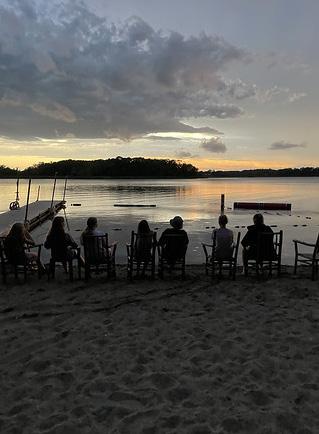
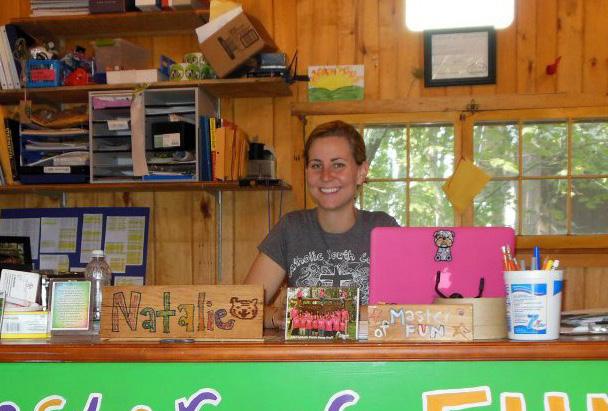
first time. Camp gives us life-changing big firsts, like introducing us to an activity that becomes a passion, meeting a lifelong friend, overcoming an obstacle, or learning about yourself in a meaningful way.
In this issue, “first time” came up in a lot of the stories. You’ll find stories about a firsttime camper, first-time counselors, about the first building built at Camp du Nord, and about several exceptional people who led the way for the campers and staff that came after them.
YMCA OF THE NORTH


I worked in camping for 21 years before coming to this role, and I have a lot of my own camp stories. But listening to other people tell their camp stories and writing these articles is such a pleasure. I hope that this magazine can be a conversation between the Y and our camp community. I appreciated your feedback and the stories you shared after reading the last issue, and look forward to connecting with you again as we take a trip down memory lane.

There are so many “firsts” that we experience all throughout our lives and many of them are forgotten as quickly as they happen. But there are others that stick with us. Big firsts. The kind of “first time I ever” stories that make us who we are and get retold over and over again.
If you’ve had the pleasure of going to camp, “the first time I ever …” stories are plentiful. Camp gives us small firsts, like seeing travel toothpaste for the

651 Nicollet Mall, Suite 500 Minneapolis, MN 55402 ymcanorth.org
YMCA CAMP DU NORD Ely, Minn. campdunord.org
YMCA CAMP ICAGHOWAN Amery, Wis. campicaghowan.org
YMCA CAMP IHDUHAPI
Loretto, Minn. campihduhapi.org
YMCA CAMP MENOGYN
Grand Marais, Minn. campmenogyn.org
YMCA CAMP NORTHERN LIGHTS


We want this magazine to tell the story of our camps. These articles are just small snippets of the life-changing work that has been happening for decades and continues to happen every day at each camp. My hope is that you see yourself somewhere in this issue and that it brings you joy to be part of this community.
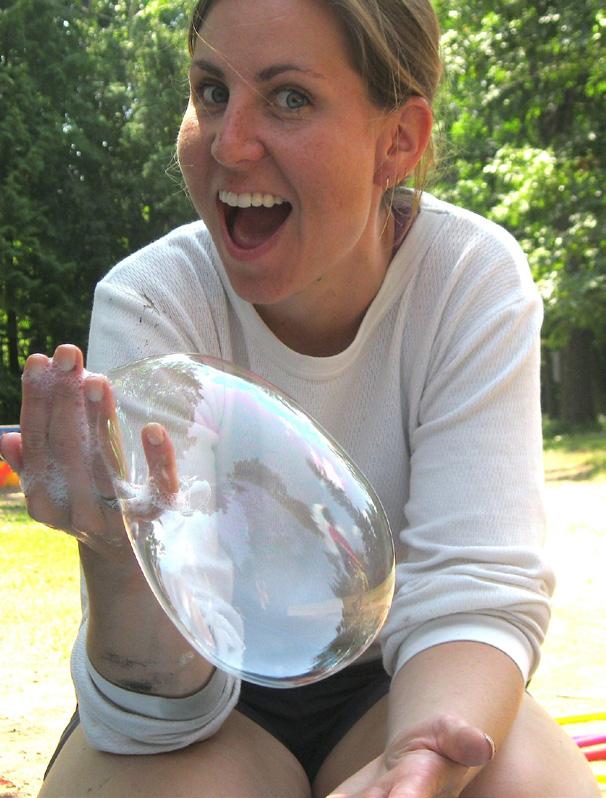

Babbitt, Minn. campnorthernlights.org
YMCA CAMP ST. CROIX
Hudson, Wis. campstcroix.org
YMCA CAMP WARREN
Eveleth, Minn. campwarren.org
YMCA CAMP WIDJIWAGAN
Ely, Minn. widji.org
GIVE THE GIFT OF CAMP ymcanorth.org/k2c
EDITORIAL STAFF
3
of
Pollock Latner Photo Director
Jorgensen Guest Writer
Heim Design and Layout Monica Kenney Shane Hoefer Editorial Team Michelle Edgerton Executive Vice President of Advancement and Development
KING Director of Alumni Philanthropy
“Letters from Camp”
King
Natalie King Editor and Lead Writer Director
Alumni Philanthropy natalie.king@ymcanorth.org Joe
Scott
Gretchen
NATALIE
Editor,
Natalie
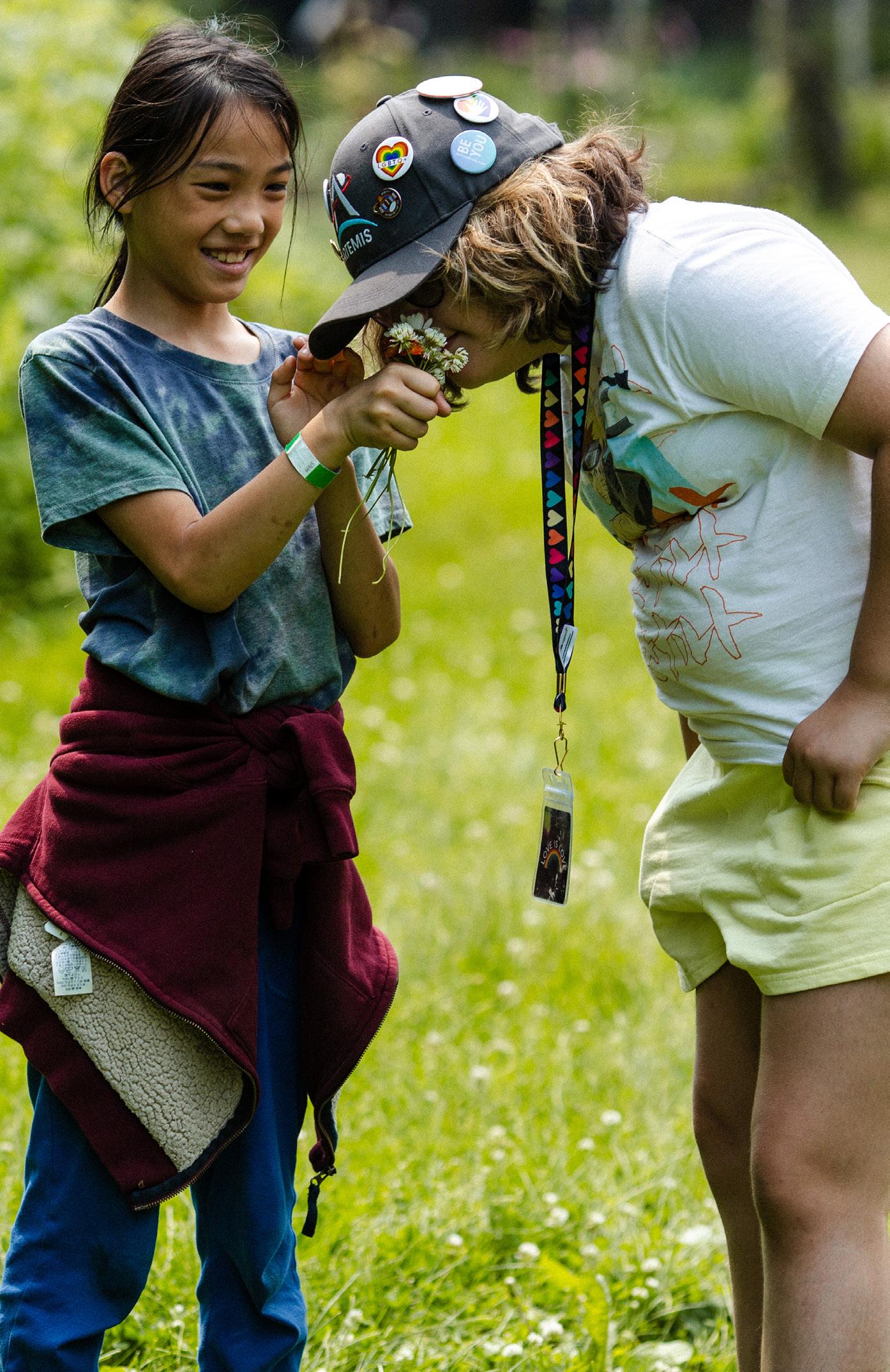
ALUMNI EVENTS
WE WANT TO HEAR YOUR FEEDBACK!
This is “Letters from Camp’s” second edition and we are working hard to put out the best magazine possible. How did we do? What else do you want to see? Help us improve by giving us your suggestions.
ymcanorth.org/adventure
LettertotheEditor@ymcanorth.org
or contact Director of Alumni Philanthropy
Natalie King at natalie.king@ymcanorth.org
Maple Syrup Festival at Ihduhapi
Volunteer Work Weekend at Camp Icaghowan
Volunteer Work Day at Ihduhapi
Work Weekend at Warren
Work Weekend at Menogyn
Pancake Breakfast at Menogyn
Work Weekend at Warren
Barn Dance at St. Croix
Farmer’s Market and Pizza Night at St. Croix
116th Celebration at Icaghowan
(see page 20 for details!)
Farmer’s Market and Pizza Night at St. Croix
Farmer’s Market and Pizza Night at St. Croix
Farmer’s Market and Pizza Night at St. Croix
Farmer’s Market and Pizza Night at St. Croix
Farmer’s Market and Pizza Night at St. Croix
Fest du Nord Music Festival at du Nord
95th Reunion at Widjiwagan
Farmer’s Market and Pizza Night at St. Croix

MAY AUG APR JUL JUN SEP
4 17-19 24-27 26 31-Jun 2 14 26-28 6 13 15 27 11 25 8 22 30-Sept 2 13-15 19
FIRST TIME CAMPER CONTINUES A FAMILY LEGACY
Even for a third-generation Warrenite, there’s still a first time at camp
Skylar Schaffner is 8 years old and in third grade. She agreed to meet with me to share her experience going to YMCA Camp Warren for the first time in summer 2023.
When I arrived at Skylar’s house, one of the first things she showed me was her special camp bulletin board. She got the board specifically to display the letters and mementos from her week at camp. Letters hang from the board, from friends, parents, her sister, grandparents — and one from her uncle TJ, a Warren alum who stayed in the same cabin as Skylar’s: Cub 2. She also had a cabin photo and her Polar Bear Plunge certificate.
Camp ended months ago, and yet these items still occupy a place of honor in her room, and Skylar was eager to share them with me.
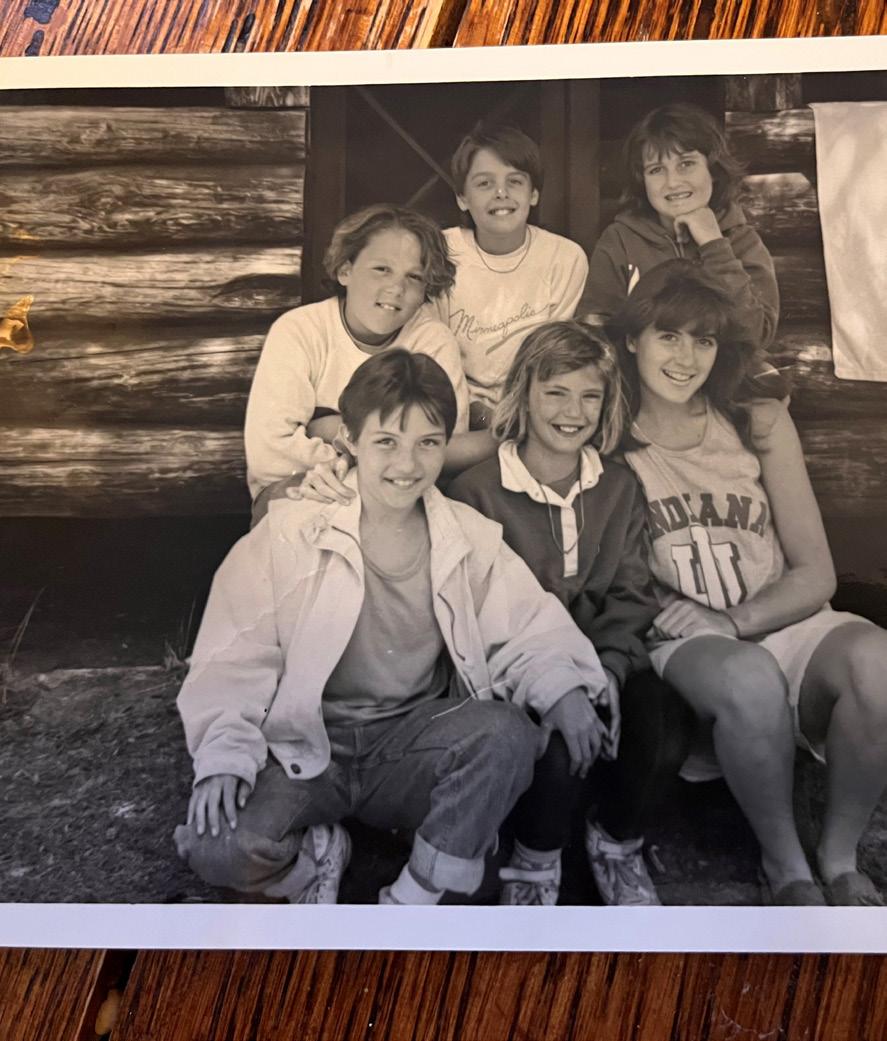
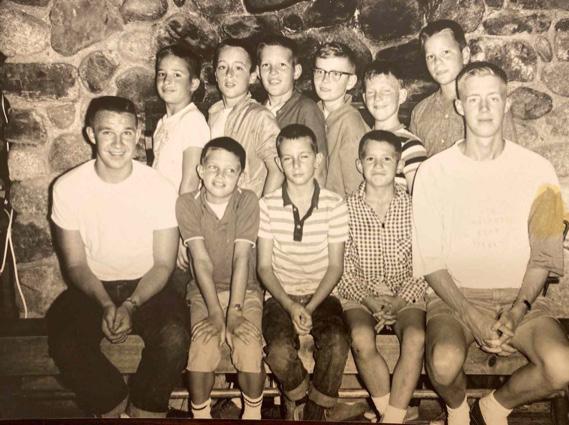
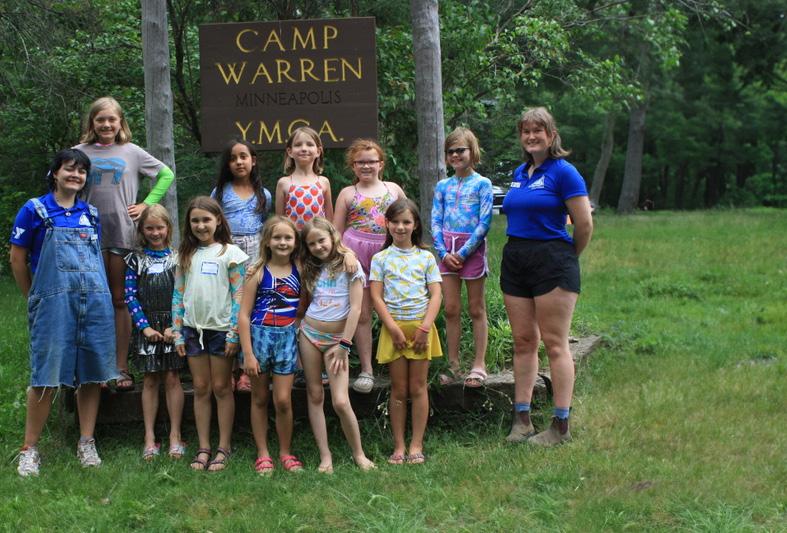
Perhaps it should come as no surprise, but knowing as I do that Skylar is the third generation of her family to go to Warren, it’s still striking. And the letters to and from camp vividly show how the Warren experience runs like a connective thread from Skylar through her mom, Kate, to uncle TJ Moss, and Grandpa Tom Moss.
Kate, a Warren camper from 1986-88, told me that “even
“Camp was very empowering for her,” she says, “and to have her own story that was
all hers was really special for her. I think she really enjoys the opportunity to explain a world that we aren’t part of, such a special place that is her private universe.”
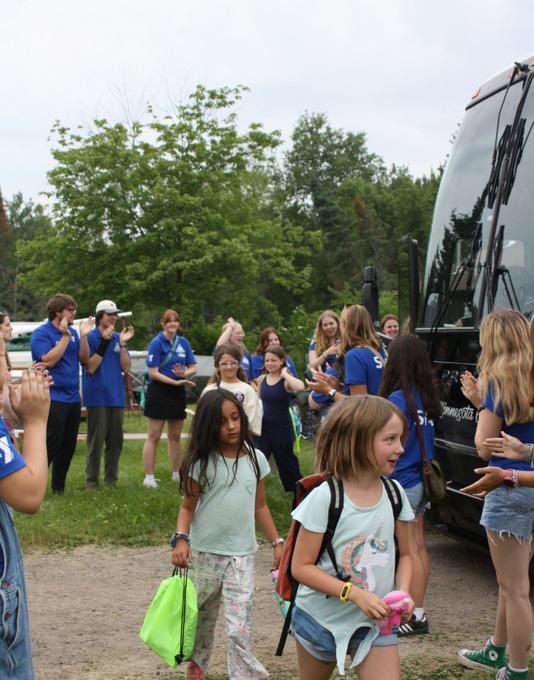
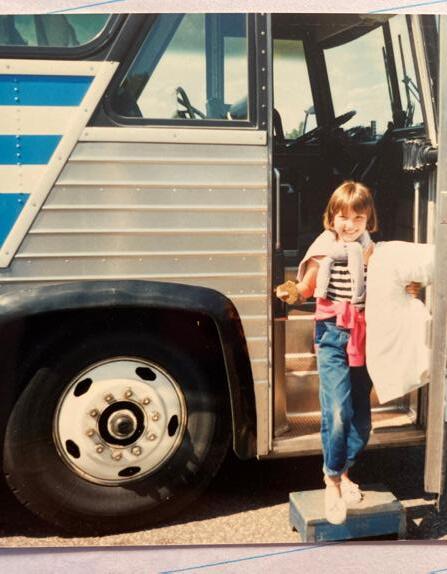
While her first week at Camp Warren was a unique and special memory for Skylar, that firsttime experience is relatable to anyone who has been to camp. We have those memories of nerves, excitement, new experiences, learning about yourself and coming home stronger and more confident. How many former campers can nod their heads and say, “yep, same” at that description?
It’s certainly true in Skylar’s family.
Tom Moss — her grandpa — can relate. Tom’s first year as a Warren camper was in 1961 when he was 10 years old. He loved it and continued as a camper for 6 summers, and was a Warren counselor from 1968-74. Later, he served on the board of directors, and became a camp parent when
1 2 4 3
6
Skylar and her group, summer 2023
he sent his daughter Kate and son TJ to camp in the 1980s and 90s.
Tom’s memories of being a camper are 60 years before Skylar was at camp and yet are so similar. He remembers being nervous getting on the bus and leaving his family, but he was excited to meet his cabin mates. He loved sailing and horseback riding. He came home from camp each summer with new skills, higher self-confidence, and new friends.


Skylar said many of the same things about her first week at camp. “I was nervous to leave my family for a week, but excited for the activities. I was super excited to meet my cabin mates and counselors.” She was impressed by how big the dining hall was, and enjoyed the energy and commotion at meals, as well as the family-style dining experience. She liked shooting archery and swimming and giggling with her cabin mates during rest time.
Tom was thrilled Skylar went to camp and when she returned, he was intentional about listening to her tell these stories about camp without jumping in with his memories. He wanted to hear her stories as though he hadn’t already been there and experienced the same things.
“I don’t think I did that very well when my kids were campers, but I’m figuring it out with Skylar and delighting in seeing my camp with fresh eyes through her descriptions. And I’m happy to have the shared experience of camp with her.”
Skylar talked a lot about how cool, nice, funny, and fun her counselors were. It reminded Tom of an experience he had when he was a camper. He was learning bare-back riding when suddenly, his horse took off running.
Instinctively, he threw his arms around the horse’s neck and hung on. The instructor had to chase after him and stop the horse, and all of his friends were laughing at how silly he’d looked. His counselor said, “That was fantastic! Did you see him hold on?! Terrific horsemanship!” The counselor turned an embarrassing experience into a moment of pride and a wonderful memory.
A few years ago, Tom went to a new church and when he walked in, there was Ted Nelson, the
I don’t think I did that very well when my kids were campers, but I’m figuring it out with Skylar and delighting in seeing my camp with fresh eyes through her descriptions. And I’m happy to have the shared experience of camp with her.
counselor who saved him on that horse. Tom reminded him of the story and Ted had no recollection. It struck Tom how powerful a counselor’s impact can be, often without even realizing it.
It’s been 62 years since Tom’s first week at camp, but he still keeps in touch and sees Camp Warren friends regularly. It hasn’t even been a year since camp for Skylar, but she still keeps in touch with several of her cabin mates as well.
One of the things Tom loves about Camp Warren is that “it’s a place you can build summer to summer, and also

generationally. The impact camp has had on me and my family over the years is so powerful.”
Kate agrees.
“I was so excited for her to go. I knew she was going to have fun. But when I signed her up, I didn’t even think about it being the beginning of a very long camp journey, like, every summer from now until forever. We’re in this.”
As for Skylar, she’s counting down the days until she returns to Camp Warren next summer.
She’s excited for the all-camp games, doing pottery in arts and crafts, seeing friends she made last year and making new friends. She will be returning for a 2-week session because one week was “just not enough!”
I’ve never heard something truer than that.
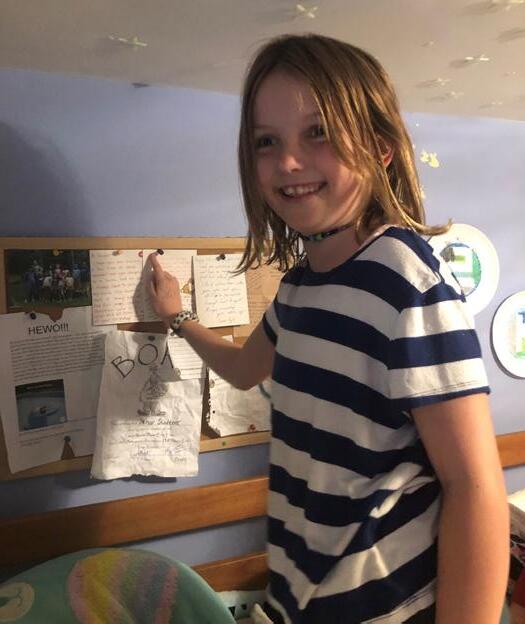
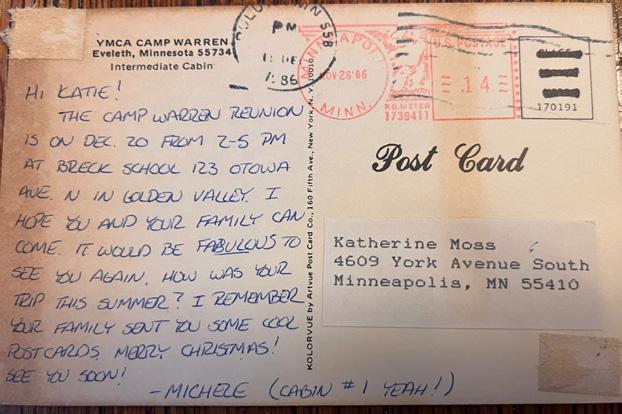
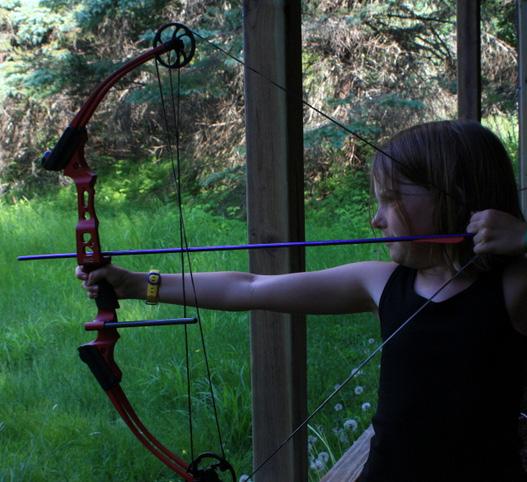
1. Kate and her group, 1987. 2. Tom Moss and his cabin group 1961. 3. Skylar getting on the bus for camp, 2023. 4. Kate Moss leaving for camp in 1986. 5. Skylar’s bulletin board. 6. Postcard to Kate from her counselor. 7. Skylar at camp. 8. Skylar and her bulletin board of camp mementos.
5
6 7 8
MORE ABOUT CAMP WARREN 7
LEARN
LEADING A WAVE OF CHANGE
Early women campers and the first female guide at Camp Menogyn

Last fall, as I wrote the story about Jack Murdock, the legendary director at YMCA Camp St. Croix, I became fascinated as I contemplated his most significant legacy: opening up camp to girls and women in 1974.
I found myself thinking about those girls, the first ones to be there. About the YMCA’s long-standing history of being a “boysonly club.” When and how did YMCA camps evolve to incorporate female attendees?
Was it a slow integration? Bumpy? How did it go for those first girls?
This is the story of how young women canoed their way into the culture and history of YMCA Camp Menogyn, and heralded a greater change to come: the integration of girls and women into the YMCA camping community. It’s the story of Terry Klepinski , who organized her own girls trip out of Menogyn as a 16-year-old, and this is also the story of Maribeth Lundeen,
who followed Terry several years later as Menogyn’s first official female guide leading female trips. And it’s the story of Meghan Cosgrove, first female executive director of Menogyn.
Why not me?
Before a broader integration that came in the 1970s, change was already brewing thanks to a handful of women who were leading the way. One of them was Terry.

In the 1950s and ‘60s, Menogyn was a boys’ camp, but there were female campers who were allowed to come as their own groups although they had to provide a chaperone, transportation, and pay their way. Oh, and they were only allowed at camp during the times that weren’t already filled by male campers. Terry’s story represents these Menogyn women.
Terry heard about Menogyn through a family friend in 1964 and remembers thinking, “our family went camping every
It was empowering. It put us into situations where we were allowed to do things we couldn’t do at home. We found out what our abilities and limits were.
1
Maribeth and the first Femmes group in 1970
8
year, so I knew I could do it.” At 16 years old, she recruited eight friends and assembled a group. She found a chaperone, raised the money to get there, and took a Greyhound bus to Grand Marais, staying in a hotel the night before they were scheduled to arrive at Menogyn.
The group was assigned a guide and set off on a seven-day canoe trip. “Everyone had a wonderful time, but we wanted to do more. Every time we asked, we were told, ‘Women can’t do that’, so we were limited.”
The following year, she assembled a new group, and that year, they didn’t hold back. “It was rainy, cold, rough. We did all the preparation to go out, took the canoe test, we prepared the food, set up the tents. We went out on trail, canoed all day, moved to a new spot every night. The guide was surprised because he didn’t need to tell us twice — we took things seriously, did things the right way.”
“It was empowering. It put us into situations where we were allowed to do things we couldn’t do at home. We found out what our abilities and limits were.”
Terry remembers going camping with her family after she had been to Menogyn. On that trip, she stood up to her dad, telling him a better way to portage. She shared, “you’ve proved to yourself that you have the ability to make good choices and know what you’re doing.
Then-director Armond Paulson (1963-67) was quoted in the camp history “Memories of Menogyn” saying, “The women campers were terrific. Guides would return with tales of trail prowess by the young women that awed everyone. These beginning stages of actively inviting young ladies into the Menogyn experience was an omen of things to come.”
Meanwhile, across the BWCA
Over to the west at YMCA Camp Widjiwagan, female-led women’s trips had been running since the 1950s under director Armin “Whitey” Luehrs (1950-62). “The limits which were placed on women in the mid-fifties were a matter of attitude rather than abilities, either physical or mental.” “Widjiwagan: A History.”
In 1968, director Skip Wilke (1968-82) moved from being the trips director at Widjiwagan to become Menogyn’s executive director. In “Memories of Menogyn” he shared, “As we reflect back, the decades of the 60s and 70s were times of protest, change, and the challenging of values. In sum, I believe Menogyn benefited during these times.” During his first summer as director, he oversaw the first official women’s trip, led by a female guide.
That guide was Maribeth Lundeen.
Maribeth was Whitey Luehrs’ niece and started going to Widjiwagan when she was
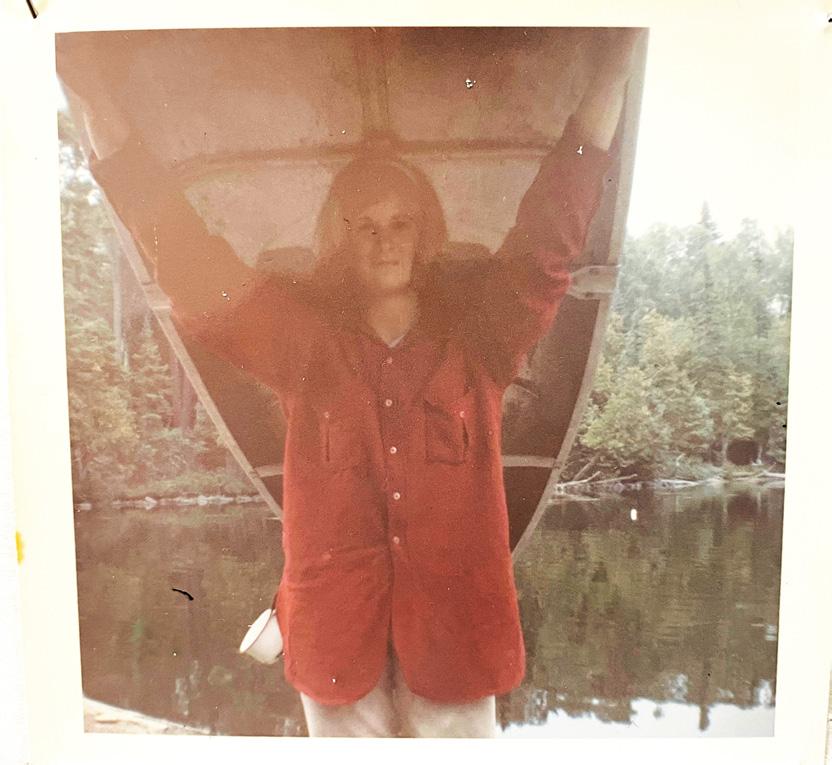

I went into the job with some trepidation. People were friendly, but it was a macho culture.
in 9th grade. She babysat for her cousins, helped in the health center, and at the end of each summer, she went on a canoe trip.
Her first introduction to Menogyn was during a cold, rainy canoe trip. The Widji guide decided they should stop paddling and stay at Menogyn for the night. They were sitting by the fireplace in the dining hall; campers had left for the summer, so it was just staff that was there. The Widji guides and Menogyn guides got into a heated debate about the women’s program. At Widji “they took for granted that women could manage themselves in the wilderness. The Menogyn guides couldn’t believe it and didn’t think it was a good idea.” She remembers thinking, “these guys don’t know what they are talking about. ”
Maribeth got to know Skip while she was a Widji camper. He became the director after her sophomore year of college. When he began planning for the women’s program, he interviewed her and she agreed to take a job in the kitchen, and then lead the first women’s trip at the end of the summer.
“I went into the job with some trepidation. People were friendly, but it was a macho culture.”
On that trip, “I felt pressure to make sure the trip went well and that the campers had a good experience. I tried to instill in the campers that going out without a male guide, you can figure out how to do something, take care of yourself and others.”
...story continues on page 11
2 3
9
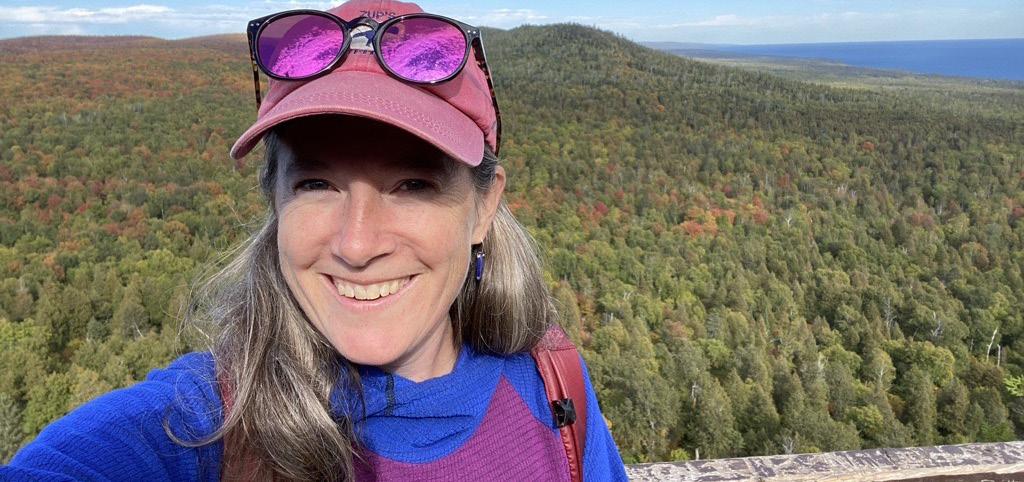
Several of the women on that first trip returned subsequent years, and eventually went on the first Femmes trip, which Maribeth led in 1970.
Maribeth returned to Menogyn in 1969 for a second year on staff. That summer there were five or six female guides and trips ran for half the summer. The following summer, Maribeth returned as the program director and the women’s program had taken off in popularity, running the full summer.
In the decade that followed, YMCA camps would begin embracing girls and women all across the country. I took a trip to the University of Minnesota’s Kautz Family YMCA Archives, whose research described the shift:
“Girls were integrated into the Minneapolis YMCA Camp programs during the decade of 1970 to 1979. ‘In order to meet the growing needs for service to the total family,’ all camps except Kici Yapi, Ihduhapi, and Warren were now open to girls. Over the course of the decade, the remaining camps were also integrated.”
‘One of the most welcoming places’
In 2017, 49 years after the first official female trip went out with Maribeth as the guide, Menogyn welcomed a new director, the first female director in its history. Meghan Cosgrove arrived at Menogyn with an extensive Y camp background, having been a camper, seasonal staff member, and the executive director of Camp Warren, as well as a wilderness guide in Maine.
Meghan is quick to note that Carolyn Sakstrup and Mo Martin both served
as interim directors for Menogyn, so technically, she was the first full-time female director, but they also held the position, albeit temporarily, before her.
have paved the way for female-identifying campers to thrive at Menogyn. It’s also important to note our commitment to allgender trips as we evolve our programming into the future.”
And as Menogyn moves into the future, it is those leaders who continue to keep inclusivity in mind as they create programming to give campers an opportunity to grow, learn, have fun, and be part of the legacy of the Menogyn experience.
Meghan described her arrival to Menogyn as, “truly one of the most welcoming places in the world.” The macho culture that Terry and Maribeth encountered was not what Meghan experienced. She said she couldn’t say when the tone shifted, but that “Menogyn works hard to cultivate a welcoming culture. We are excited to celebrate individuals’ unique contributions to the community, and there’s a natural solidarity that comes from the shared experience of living and working in this remote place.”
Menogyn works hard to cultivate a welcoming culture.
She went on to say, that “At Menogyn, there is an ongoing examination of who we want to be as a community. This introspection has always been fundamental to our identity and it allows us to remain relevant with changing times.”
Menogyn has had strong leaders, both female and male, who have kept camp running for over 100 years.
When asked for her thoughts on being a female leader and reflecting on those who came before her, Meghan said, “There have been many fierce Menogyn women who 4
1. Menogyn paddle from 1971. 2. Terry portaging a canoe in 1964. 3. Top row from left, unknown name, Shelia Gray, Mary Freeman, Hammernick, Marillea Straughan, Terry Heinrich, Middle row from left, Jan Gottschalk, Mary Hughes, Mary Geiger, Bonnie West, Mary Phillips, Center front guide Chuck Jennings, child unknown 4. Meghan Cosgrove, current Menogyn executive director. 5. Early Menogyn women, 6. Early Menogyn women 1958.


5 6
LEARN MORE ABOUT CAMP MENOGYN 10
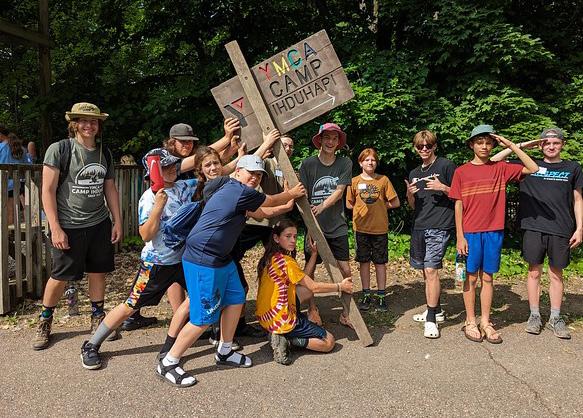
IHDUHAPI’S FIRST-TIME COUNSELORS’ FIRSTTIME MEMORIES
of the summer, I had tan lines on my feet from my sandals and odd tan lines on my arms from all the friendship bracelets — not exactly what I’d been imagining.
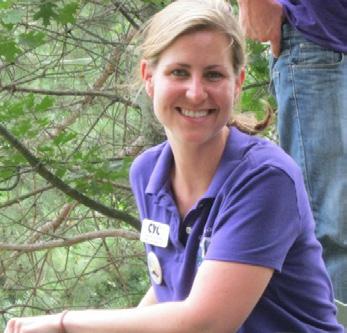
My first memory from being a camper at YMCA Camp Ihduhapi was being shy and nervous and very hesitant to join in the group games. I was standing on the side of the field, arms crossed over my chest, observing the whole camp scene in front of me. I distinctly remember thinking, “I’m not playing that silly game, but I would like to get my hands on one of those clipboards!”
Being a camper didn’t appeal to me, but being in charge, now that was something I was ready for. I was 8 years old at the time.
Overall, I continued to be an unenthusiastic camper, but my dream of being a camp counselor was firmly in my heart and mind.
At 18, that dream came true! I landed a job as a camp counselor at YMCA Day Camp Guy Robinson in 2000. I arrived at staff training excited to collect my clipboard with visions of sunshine, fun, and relaxation.
Well – two out of three isn’t bad!
It was 10 minutes into the first day of camp and my campers were all staring at me when I realized how wrong my impression of being a counselor had been. This job wasn’t easy. There was some singing, but no relaxing. And that tan I was hoping to get? By the end
Being a camp counselor was harder than I had expected, but not in a bad way. It was empowering and fulfilling. I gained skills, grew in confidence. I truly felt like I made a difference. Every bit of my effort was worth it. I returned to camp every summer of college, and then quit my first two, full-time jobs to return for two more summers until my parents told me I needed to find a real job and stick with it. And so I got a job at the YMCA as a day camp director and began my full-time camping career.
For some people, becoming a camp counselor is a childhood dream fulfilled: years of being a camper leading to an inevitable position on staff. But for others, it may be because of friends, or because
2023
Duvan and camp staff,
...story continues on page 13 11
Natalie King as a counselor in 2000
you’re trying to gain specific skills for a future career. Whatever it is that brings you to camp as a counselor, most will agree that there are surprises you didn’t anticipate, you will learn a lot, and weird tan lines are to be expected.
These themes are featured in the conversations I had with first-time Camp Ihduhapi counselors who allowed me to share their tales from last summer.
Something that he learned this summer is that “every counselor has their own style of working with kids, so I spent time really reflecting on my own. I think that good relationships are built from respect and that is how I approached camp counseling.
“I tried to be clear about rules and safety, but comfortable with kids being excited and loud, and I tried to overall have a relaxed style of letting ‘kids be kids’.”
It’s like watching a TV series but starting in season five: You don’t know the characters or what is going on in the plot, but gradually you start
It was beautiful to see everyone listening to each other share their experience. It was magical.
Duvan
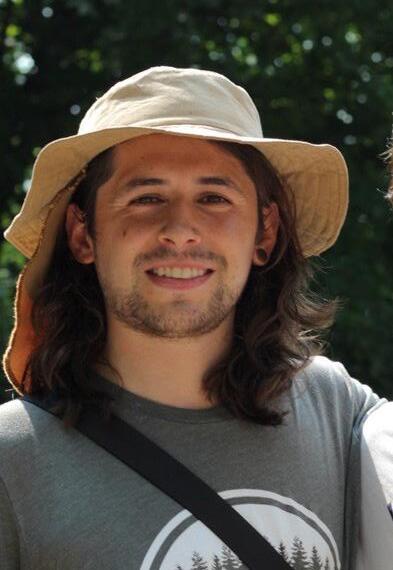
Duvan Quitian is a student at the Universidad Pedagógica Nacional and learned about the international camp counselor program from one of his friends who had participated last summer. Once he applied and was chosen to be part of the program, he created a profile about himself and waited to be contacted by a camp. He was eager to practice his English, visit the United States for the first time, and while he had experience working with kids, he was looking forward to expanding his skills.
When he was chosen by Ihduhapi, he was excited to go to the “Land of 10,000 Lakes” because he loves all activities that have to do with the water. Duvan was shocked by the beauty of Lake Independence, the maple forests, and all of the places to explore around camp.
When his campers left at the end of the session with their parents or even grandparents, Duvan was amazed to learn many of them had also been campers at Ihduhapi. The concept of summer camp isn’t typical in Columbia, and the generational nature of Y camps came as an additional surprise.
His favorite memory from the summer was going on a two-week canoe trip down the St. Croix River. The weather was beautiful and the kids worked well together. He remembers paddling under the sun, the kids singing songs he’d never heard, seeing a bald eagle flying overhead. It felt like he was on safari. He said it felt like being in a movie.
Duvan was surprised at how tired, yet fulfilled he felt every day. He knew it would be hard work but didn’t know just how demanding it would be. But when he thinks about camp, he imagines the campfires at the end of the week.
“It was beautiful to see everyone listening to each other share their experience. It was magical.”
Does this story remind you of your first camp counselor?
We want to hear about your first, favorite, most life-changing camp counselors. Whether you remember their name or not, share your experience with us. You might be included in the next issue of “Letters from Camp.”
to figure it all out, and eventually, you know everyone, understand how things work, and it feels like you belong.
Logan
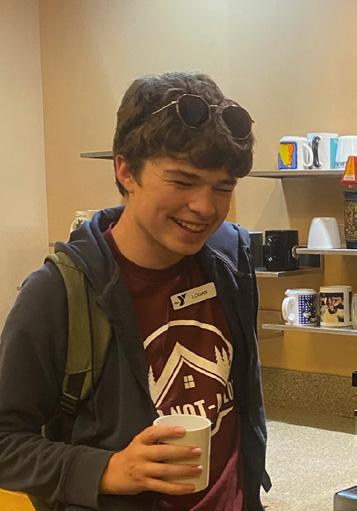
Logan was both a camper and a counselorin-training (CIT) at Ihduhapi, and when several of his CIT friends decided to get jobs as camp counselors, he followed their lead. He described being a camp counselor, saying, “it’s like watching a TV series but starting in season five: You don’t know the characters or what is going on in the plot, but gradually you start to figure it all out, and eventually, you know everyone, understand how things work, and it feels like you belong.”
Logan enjoyed seeing a group go from quiet and standoffish with each other at the beginning of the week, to then start warming up to each other, and by the end of the week, becoming friends – fully comfortable with one another, sharing laughs and jokes.
Something that surprised Logan about being a counselor was that as a camper, he thought his counselors never got tired — they always seemed full of energy and ready to go. But being a counselor was exhausting! It was a difficult job, but he really loved it, and he learned a lot about working with kids.
12

making camp awesome. He wanted to be a big part of the reason the kids had fun.
“Oh you were a camp counselor this summer?! Well that must have been fun!”
Anyone who has been a camp counselor has heard that phrase. Those who haven’t worked at camp imagine lazy days in the sunshine, making friendship bracelets and playing kickball. What they don’t realize is that being a camp counselor is an intense job that requires attention to detail, patience, thinking on your feet and a lot of creativity. It’s fun too, but it’s serious work. You are responsible for kids’ safety. You are in the business of changing lives.
Being a leader is more than having someone listen to you,” said Jonah, “it’s about meeting everyone’s needs to make sure everyone can be their best selves.
Jonas
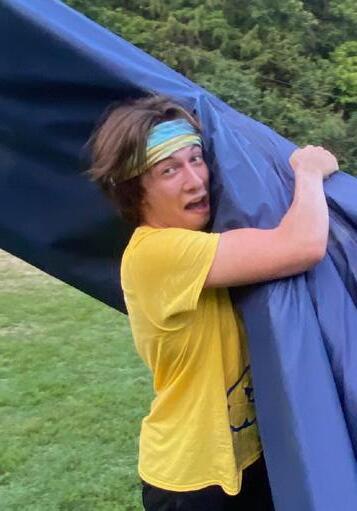
Jonas was both a day and overnight camper at Ihduhapi for six years before becoming a counselor in the summer of 2023. He loved his years as a camper and always had a lot of fun. He also remembers enjoying all of his camp counselors, but also doesn’t have distinct memories of the individuals. When he was hired, his goal was to be the kind of counselor that would be memorable for
His favorite memory from the summer was watching his cabin play Leaf Ball on Toboggan Hill. The kids were filled with energy and having the best time. Jonas was so happy to watch them be that happy. It was a powerful experience to watch a group come together, work as a team, be awesome to each other, and genuinely enjoy being together.”
Listening to Jonas talk about his first year at camp, it’s impossible not to get swept up by his enthusiasm. His smile, his energy, and his love for camp is irresistible.
“Being a leader is more than having someone listen to you,” said Jonas, “it’s about meeting everyone’s needs to make sure everyone can be their best selves. If kids are having their needs met, they are capable of following you.”
On his experience with camp, he said, “You get to explore who you are in nature, you learn about yourself — it’s such an awesome spot to get put in, to make yourself grow as a person, think more, make new friends, and have a blast.”
And while you are busy creating magic and giving kids lifelong memories, camp is changing your life as well. Maybe you signed up for this job for the clipboard or because your friends were doing it, or for a new experience, but by the end of the summer, you have grown and changed and been shaped by the magic of camp. That part isn’t listed in the job description, but for me, as well as Duvan, Logan, Jonas, and so many others, what we gained from camp far exceeds what any of us imagined it would be.
LEARN MORE ABOUT CAMP IDUHAPI
in 2023 13
Duvan and other counselors at camp
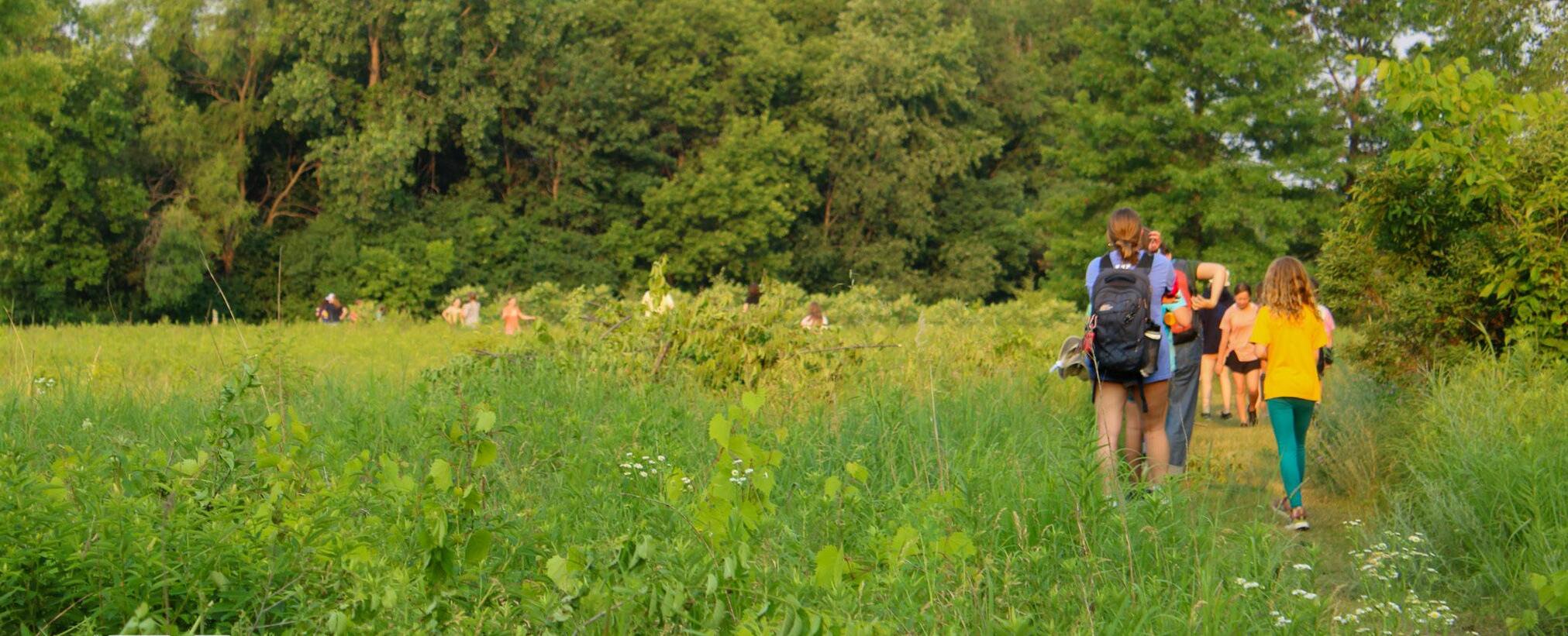
THE WAY NATURE NURTURES
A history of outdoor education at Camp St. Croix
Camp has ended for the summer.
The leaves are changing and the air is chilly. But camp is not quiet. YMCA Camp St. Croix has entered a second season of sorts. It bustles with small groups spread across the field. There are shouts of laughter and lots of activity as each group works to complete the assigned task.
Olivia, a 7th-grade student who is at camp for a three-day Outdoor education program with her school explained, “Our school has come out to do this, like, forever I think. You learn about the wilderness, do some team building and get to stay in cabins with your friends. It’s education and a bonding thing. Everyone goes every year and it’s awesome.”
The Camp St. Croix outdoor education program may seem like it has been around “forever” but actually, the program began 40 years ago, which is only a fraction of the camp’s 115-year history. Outdoor education takes kids out of the classroom and gives them real-life experiences in the outdoors. Schools with k-12 students from across Minnesota and Wisconsin send their kids to camp to get
to know their classmates and teachers in a new way, developing relationships while also learning about science, nature, weather, animals, geology, and so much more. Camp Executive Director Katie Haas explained, “At Croix, we want youth to get familiar with and curious about this place. From there, we help them build an understanding of how diverse regional environments connect, intersect, and work together.” Program Director Luna Anderson Duggan added, “my goal is for these experiences to light the spark of joy and bring in as many people as I can.”
From concept to creation to curriculum
In 1983, John Duntley (director 1983-96) was hired as the executive director of Camp St. Croix. Summer camp programming, as well as weekend conferencing, were both successful, but mid-week was quiet at camp during the school year. John had established a year-round outdoor education program when he worked for the Green Bay YMCA, so he was prepared to bring the same type of program to Croix.
The first step to creating an outdoor education program was to hire a program director. Patty Mueller had been working in Alaska for the Fish and Wildlife Service and working for YMCA Camp Widjiwagan during the summers. She applied for a year-round position at Widjiwagan, which hadn’t worked out, but then Widji’s director, Bob Rick (director 1974-89), gave her resume to John. Patty was excited to have the opportunity to build an outdoor education program from scratch, so she took the job and got to work.
For Patty and John, the first thing they developed was a philosophy, centered on care and respect for the environment, the equipment, and for the people. They wrote curriculum based on the guiding principles, with a goal of moving kids from awareness to appreciation to action.
Once the curriculum was developed, John and Patty’s two biggest challenges were finding staff to carry out the program and to connect with schools who would attend this new offering.
Once Patty was able to build relationships with school principals, she recalls the program “taking off like wildfire”. The program grew and by 1988, Patty’s position transitioned to full-time outdoor education (prior to that she had also been the program director for summer camp).
Over the following years, facilities were improved to accommodate the needed indoor classroom space, outdoor group gathering spaces were expanded, and the prairie area was cultivated to be used in programming.
John believes that camp “wouldn’t have survived, if not for outdoor ed.” Summer camp is important, but a facility can’t close down for 9 months a year. “Outdoor education helps keep camp relevant all year round.”
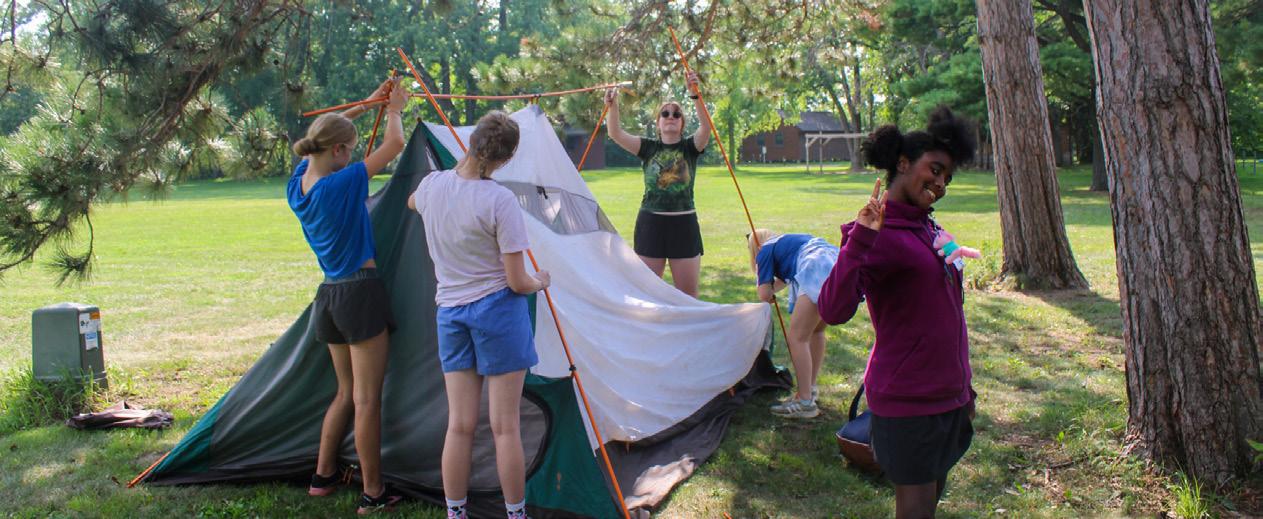
1 2 14
John shared a memory of former Camp Director Jerry Manlove (from 1949-57) visiting camp a few years into running the program. It was a week where there were a lot of outdoor education groups. He was astounded to see the programming going on and had tears in his eyes, telling John that was something he had dreamed about when he had led camp. For John, that realization was really meaningful, and he was happy to be part of the evolution of camp.
Evolving with the times
Luna Anderson-Duggan was hired as the outdoor education program director in 2023. Luna was a Camp St. Croix camper from the ages of 13-16. She was part of the King Leadership Camp, a camping program that provided scholarships to kids identified by teachers as having leadership potential funded by the Peter J. King Foundation . She had an amazing experience and was grateful to have the opportunity to attend camp, noting that she wouldn’t have been able to do so without that scholarship . Returning to Croix to be on staff felt like coming full circle and she is excited to lead this program.
Much of the outdoor ed program looks the same as when it began 40 years ago: getting kids outside, working in small groups, exploring the environment around them, and kids building relationships while learning about the natural world. The big difference
Luna is continuing the program that has been so successful for decades, but she has additional goals that center around equity in a variety of ways. She is focused on building relationships with schools that haven’t been able to participate in the past.
With the curriculum, Luna said, “people have a variety of learning styles and we want to make programming that teaches in multiple ways. We also want to make it physically equitable, building the program to be more inclusive of bodies with differing abilities.”
“When I was a camper, Camp St. Croix gave me my first experience in equity and now it’s my goal to do that for others. As the program moves into the future, I want it to not only be accessible to all, but that equity is naturally integrated into everything we do.”
The central themes will forever remain the same
When asked about his favorite memory from the early days of outdoor ed, John shared a story about a student who was quiet and never spoke up. His group was working on an outdoor survival activity, discussing what you would do if you were lost in the woods. This student suggested building a snare to catch a rabbit using a fishing line and a stick. His classmates were fascinated and he showed a skill that no one knew anything about. His
For John, it was a reminder of how important it is to get kids into a different element and give them an opportunity to show off skills or knowledge that might not be relevant inside a classroom.
Forty years later, Luna has similar stories from today. One of her favorite things is watching kids arrive at camp, nervous, complaining, and acting “too cool” for camp. But once they get into the activities, their attitudes shift, they start having fun, discussing what they’ve learned, sharing different sides of themselves, and by the end of the day, she can see a switch. Putting kids into a different environment brings out a new side of them, and that is part of the power of the program.
1. Outdoor ed group working on activities 2. Outdoor Ed group practices setting up a tent 3. Outdoor ed at St. Croix 1990s. Photo credit - John Duntley 4. Outdoor Ed group, 2023.
LEARN MORE ABOUT CAMP ST. CROIX
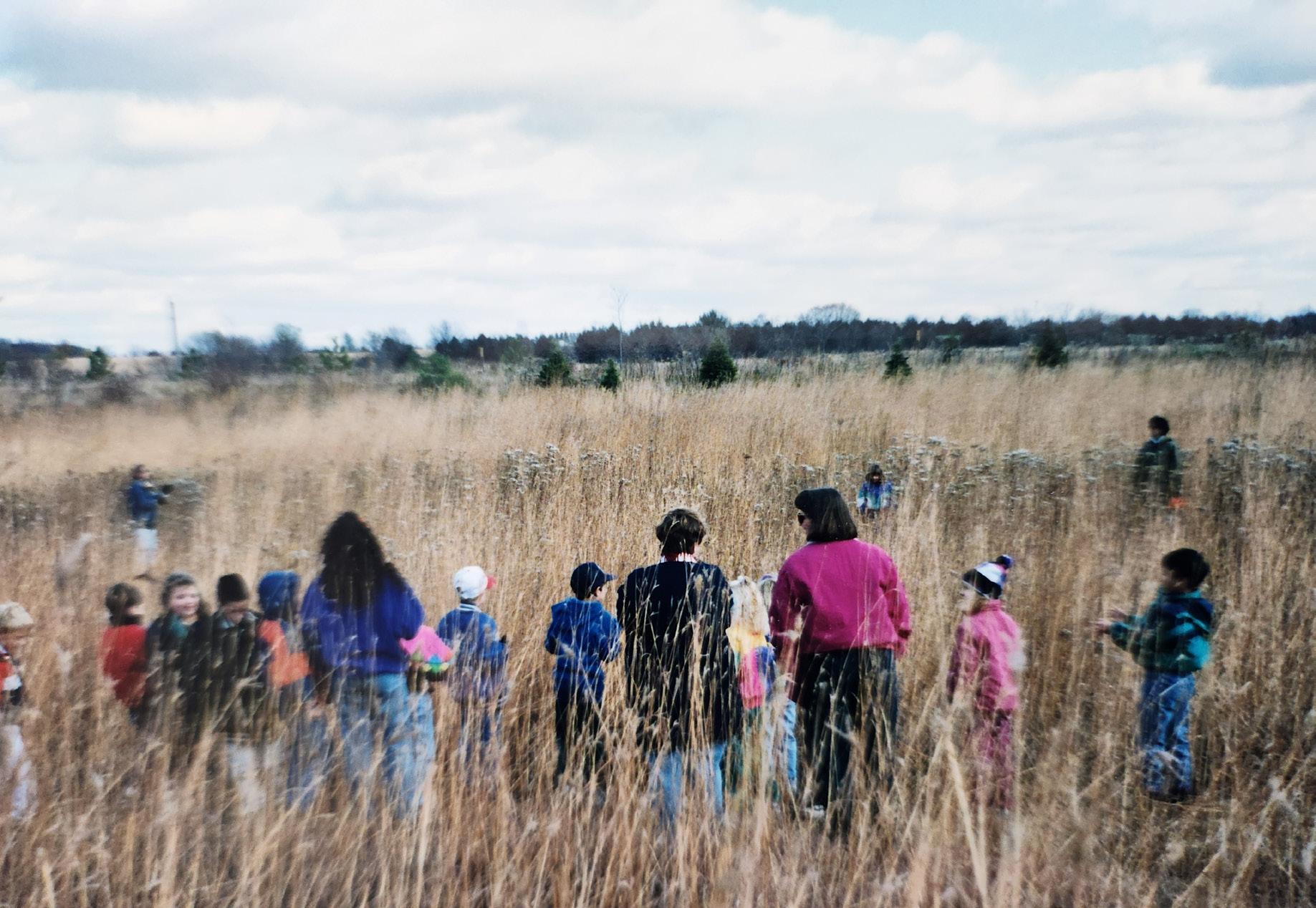
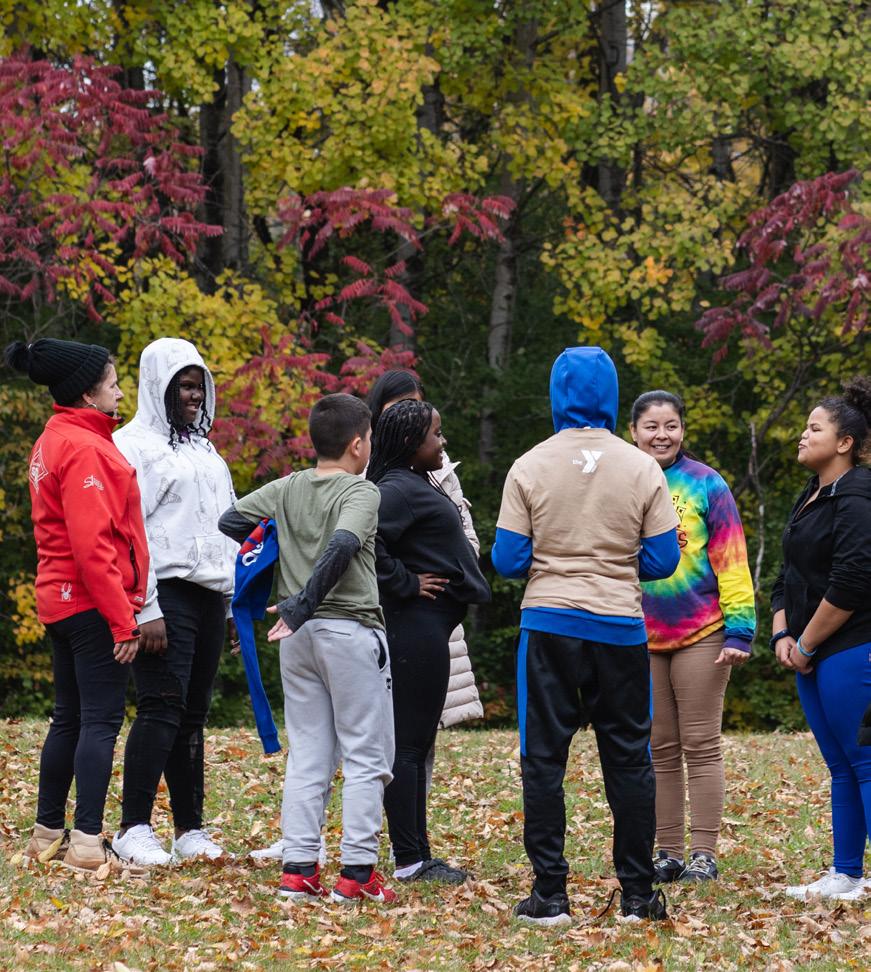
3 4 15
THEIR FIRST WINTER CAMP
Camp Northern Lights winter family camp through the eyes of one family
Samara Estroff, and her sons Ellis and Miles have attended Family Camp at YMCA Camp Northern Lights for the past few summers, but in February 2024, they experienced Bear Island Lake in a new way: Winter Family Camp. Samara loved the quiet
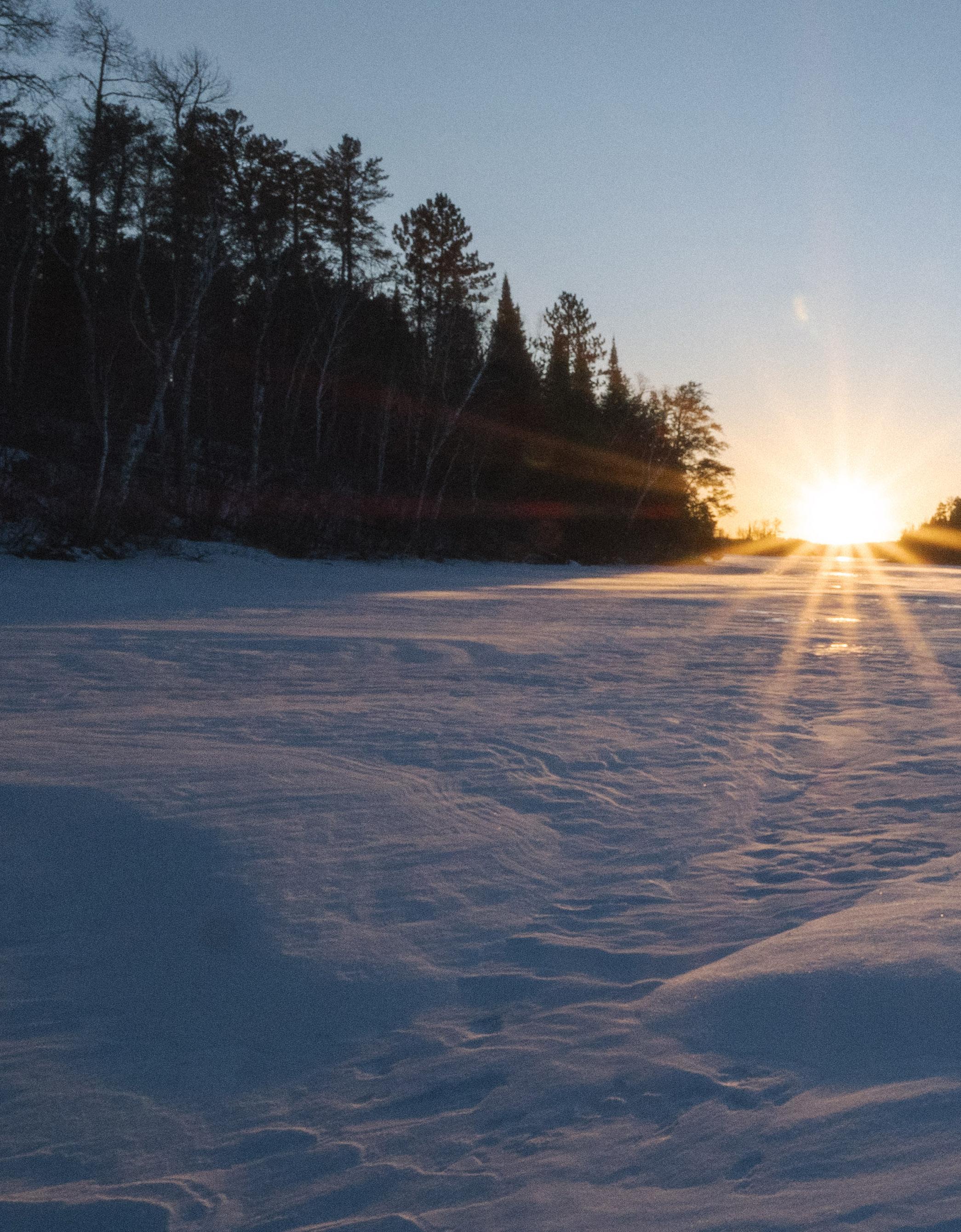
Bear Island Lake in February
peacefulness of the lake, the balance of family time together, and also the chance to relax while her boys were having fun in age group programming.
For nine-year-old Ellis, the highlight of the weekend was
jumping into a hole cut into the frozen lake to cool off after a hot sauna. He and his brother Miles jumped in three times each! Seven-year-old Miles enjoyed playing all-camp kickball, and he especially loved playing broomball for the first time.
16
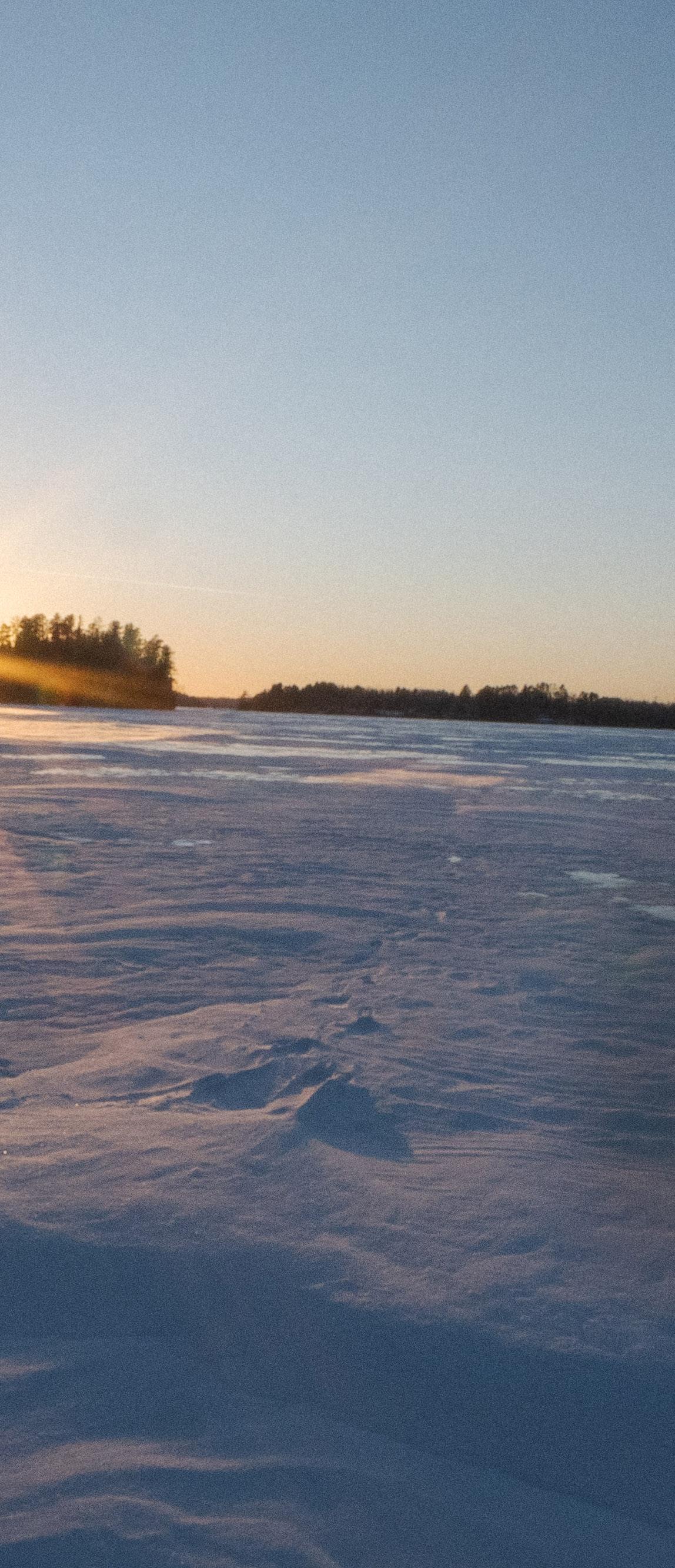

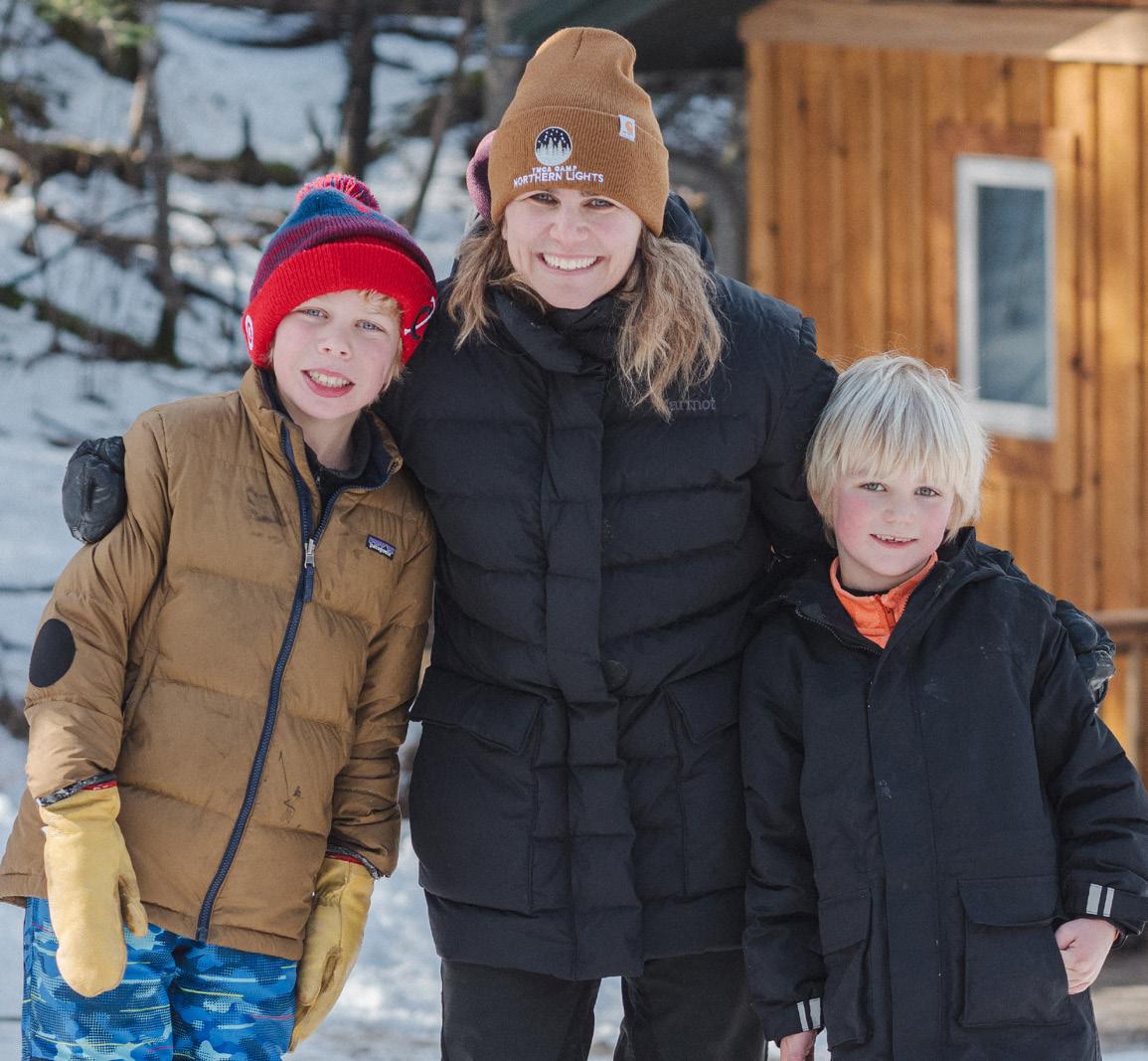

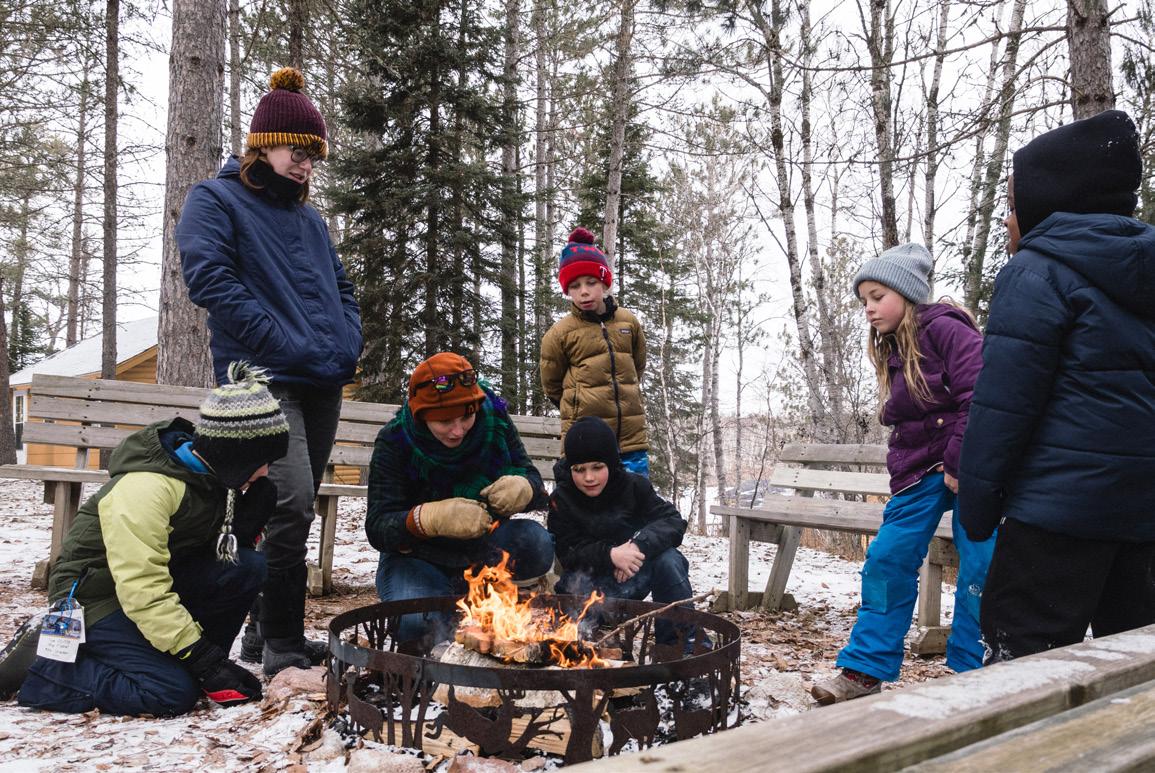
1 2 3 17
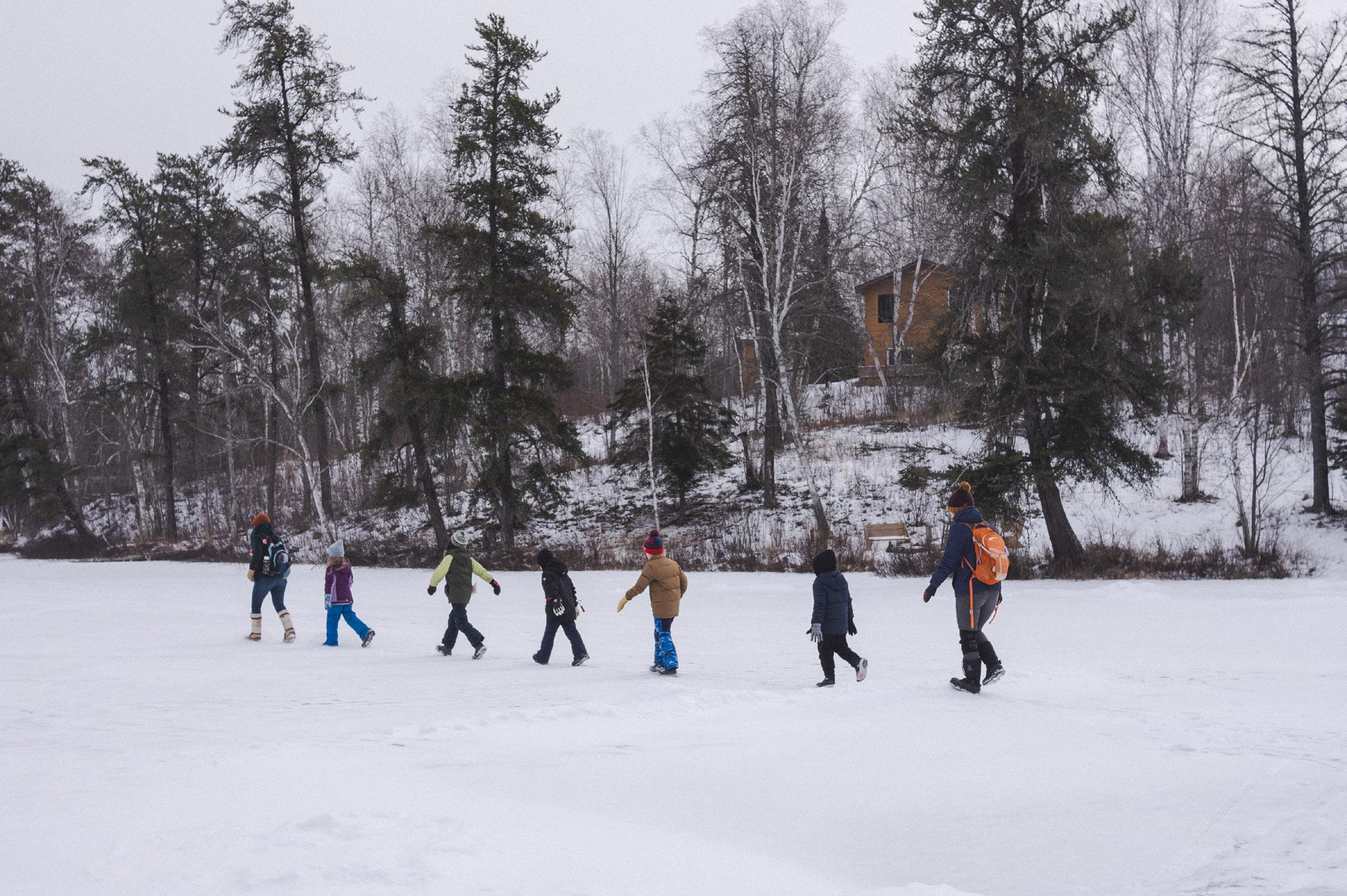
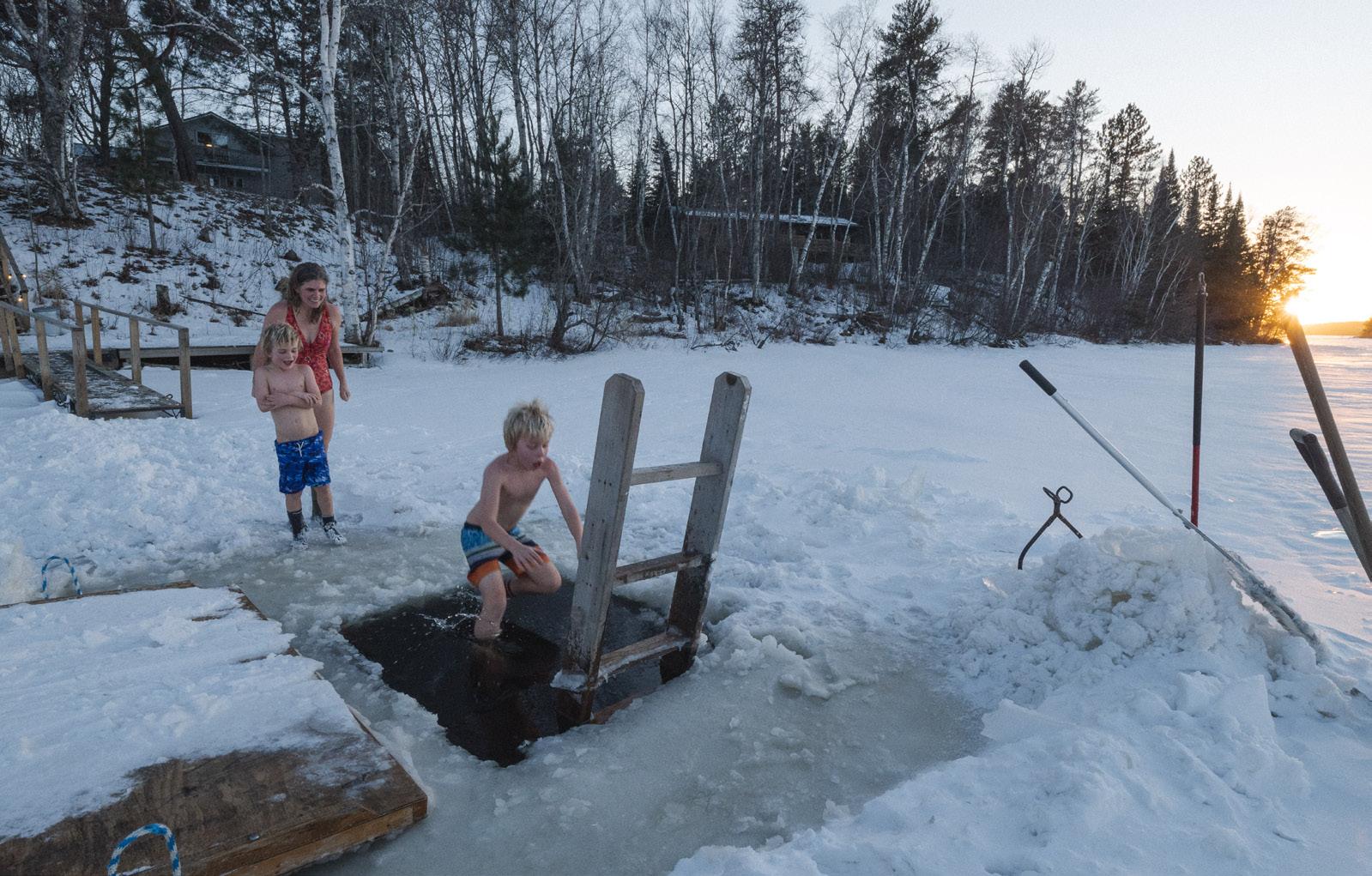
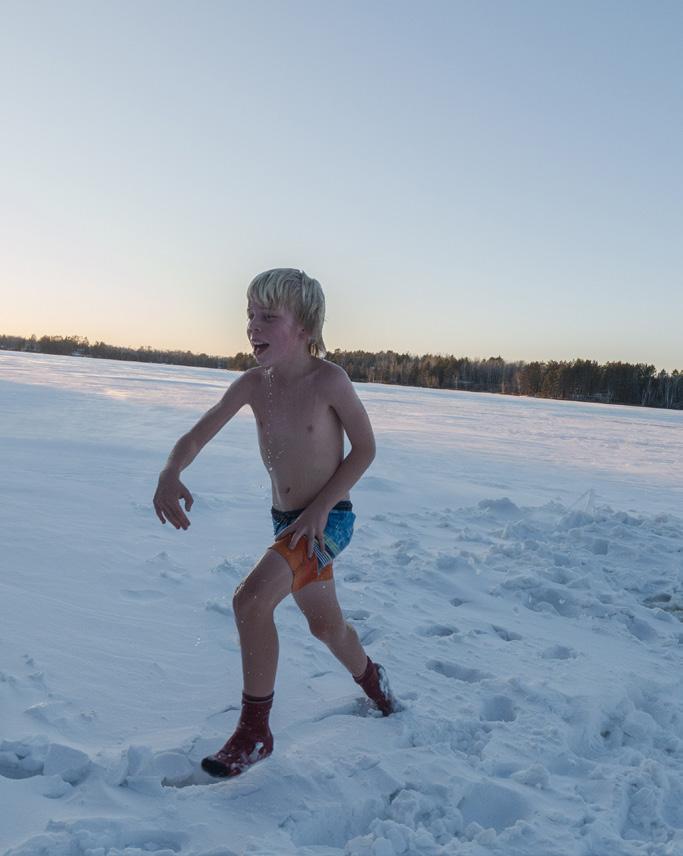

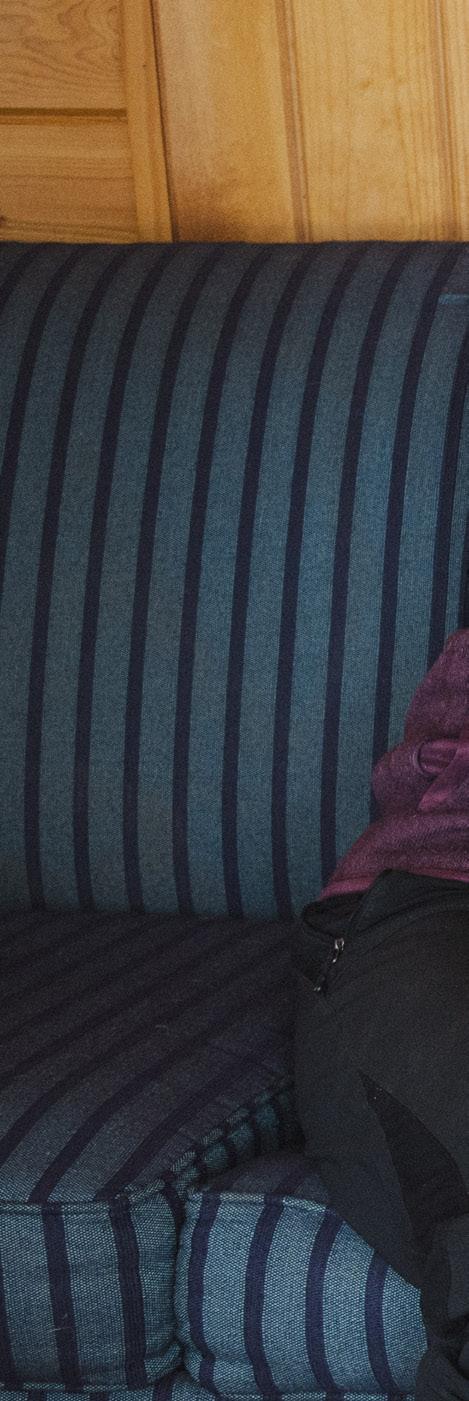
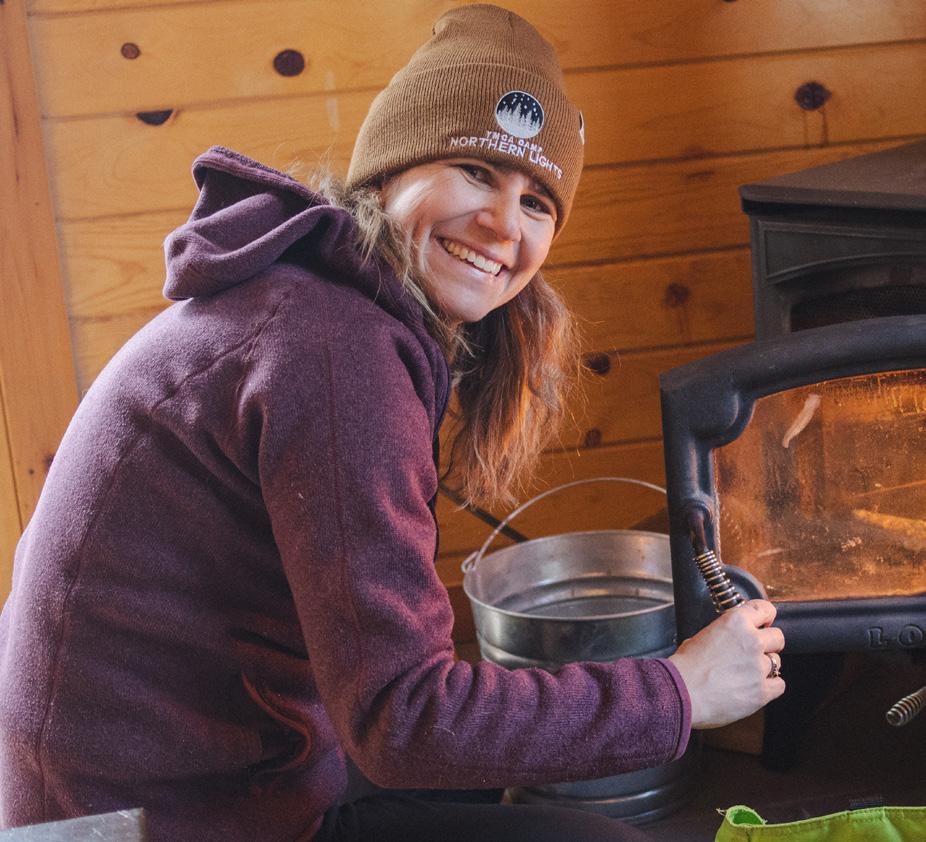

4 5 6 7 9 10 11 18



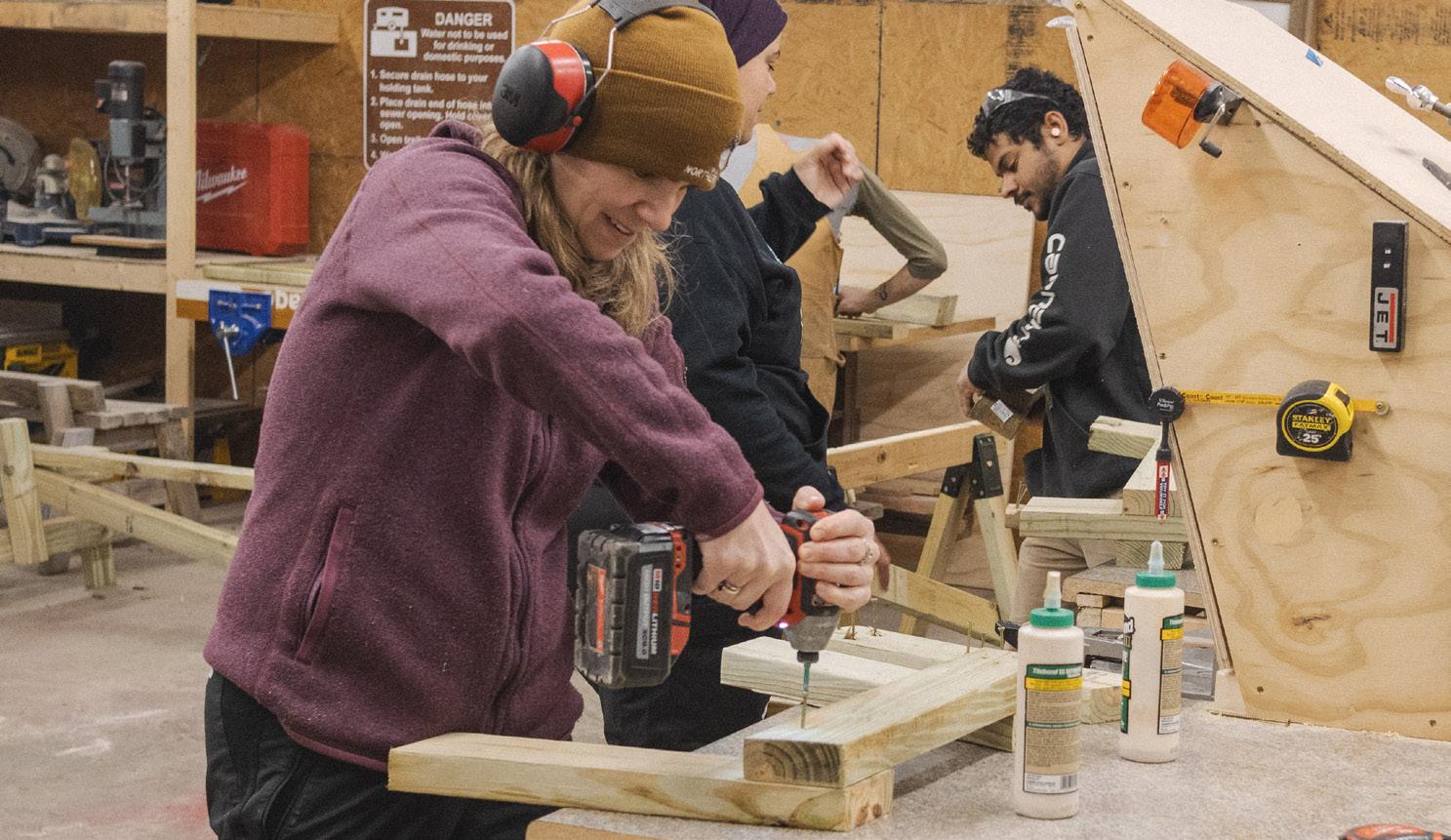
Winter camp is quieter than summer, but there was the same amount of programming and we loved the experience.
Winter Family Camp at Northern Lights is structured similarly to summer family camp programming — there are periods each day where the kids divide into age groups and go with staff to do fun camp activities. During that time, there are activities offered for adults as well. There are all-camp programs that families can opt into. Families also have plenty of time to do activities on their own.
Samara shared, “Winter camp is quieter than summer, but there was the same amount of programming and we loved the experience.”
1. Ellis(9),Samara,Miles(7)atCamp Northern Lights. 2. Counselor Miles gives the family tips for jumping into the frozen lake after being in the sauna. 3. Ellis and Miles with their counselors and new friends around a fire during age-groups. 4. Miles and Ellis with their counselors and new friends on a hike across the ice during age-groups. 5. Samara, Miles and Ellis spending time in their cabin. 6. Ellis especially enjoyed getting hot in the sauna and then jumping into a hole in the frozen lake to cool off. 7. Samara stokes the fire in their cabin fireplace. 8. Samara and Miles during all-camp broomball. 9. Ellis emerges from his dip in the lake. 10. Unseasonably warm winter weather and limited snow made winter camp sledding a special treat. The boys enjoyed being able to sled during age-groups. 11. Miles playing tetherball. 12. One of the activities offered to the adults was to build new benches to go around Bear Island Stage. Samara enjoyed learning how to build and was happy to be able to help.
MORE ABOUT CAMPNORTHERNLIGHTS
LEARN
8 12 19
Even camps get amnesia:
THAT TIME ICAGHOWAN FORGOT ITS OWN BIRTHDAY

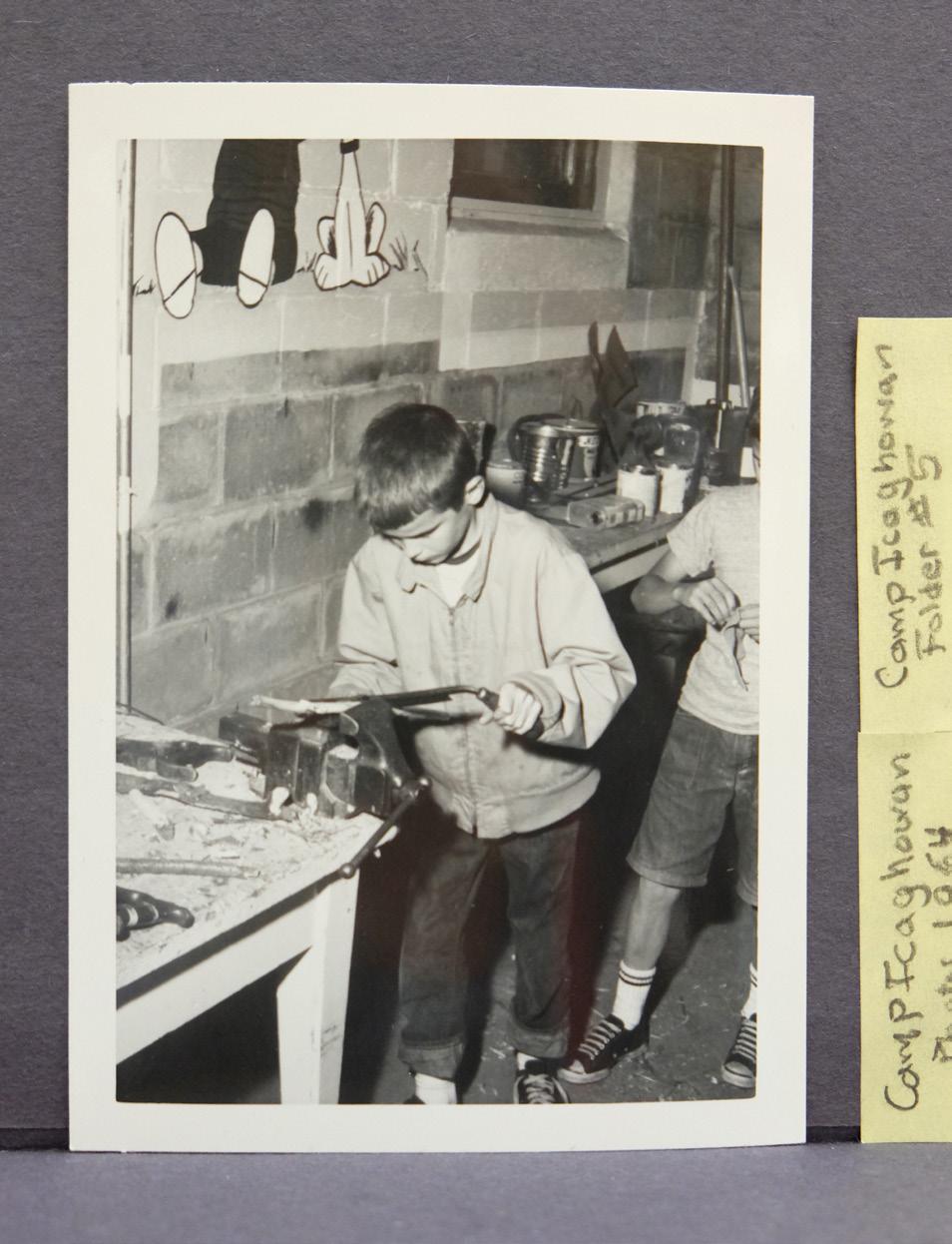
June 15th, 2024
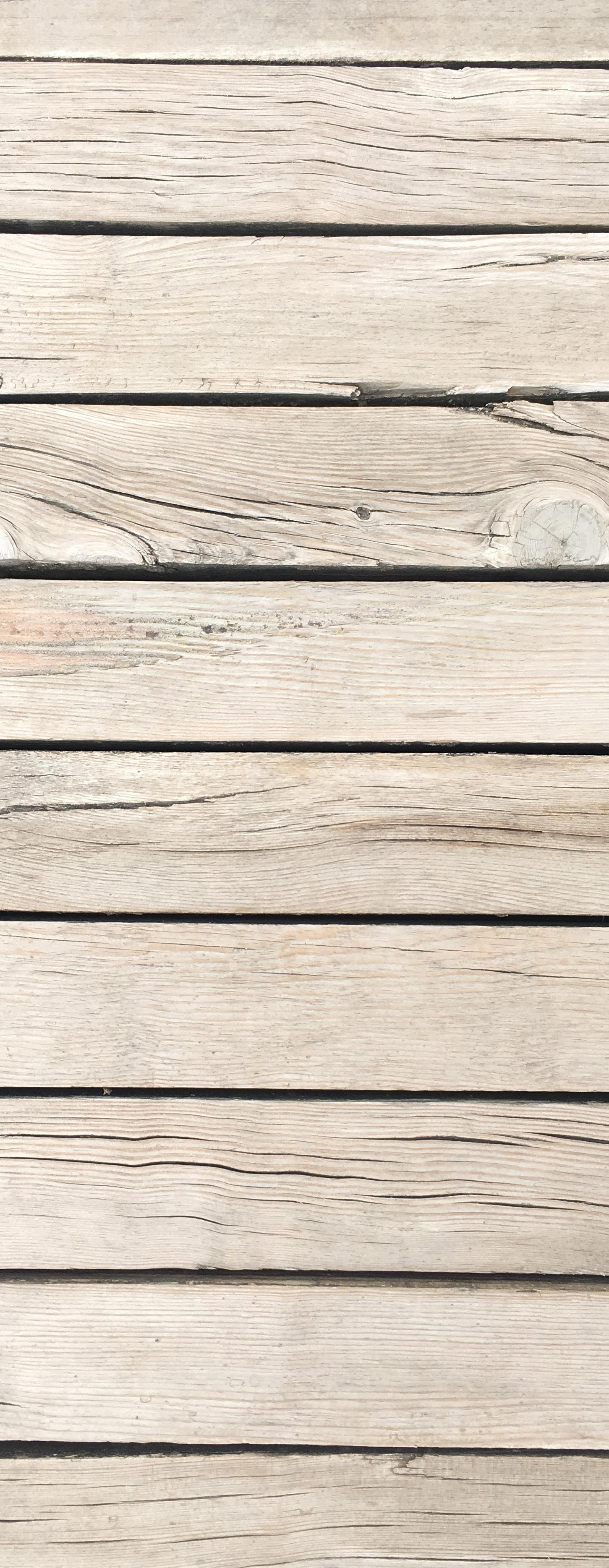
It’s been said that a camp without knowledge of its history is like a tree without roots. This is a story about recovering history, and the twists and turns such journeys often take. It’s a story about YMCA Camp Icaghowan, and people like Marjorie Meffert and Mark Dobbelmann. It’s a story about the time camp forgot it’s birthday.
And especially a story about declaring, without reservation, that Camp Icaghowan got its start in 1908, not 1909.
The journey started with Marjorie
The way Marjorie recalls the memory, “it was maybe a 5-minute interaction.” A gentleman came into the YMCA of Metropolitan Minneapolis’ Human Resources office holding a $10,000 medical bill. He hadn’t filled out his benefits forms correctly, or maybe he missed them altogether. His eyes were desperate as he asked her what he was supposed to do.
“No one was overseeing the paperwork,” said Marjorie. It was 1979 and, in that moment, she vowed that “would never again happen on her watch.”
Marjorie worked for the YMCA from 1959-98, spending the majority of her 39-year career in the Human Resources department. She confessed that she wouldn’t have aspired to be in HR, but she enjoyed getting to know people from all the branches across the association. During her career, there wasn’t a computer system, so she had to do everything manually and come up with her own systems for organization. She said, “If you are going to do something, you need to do it right. Especially in HR, you
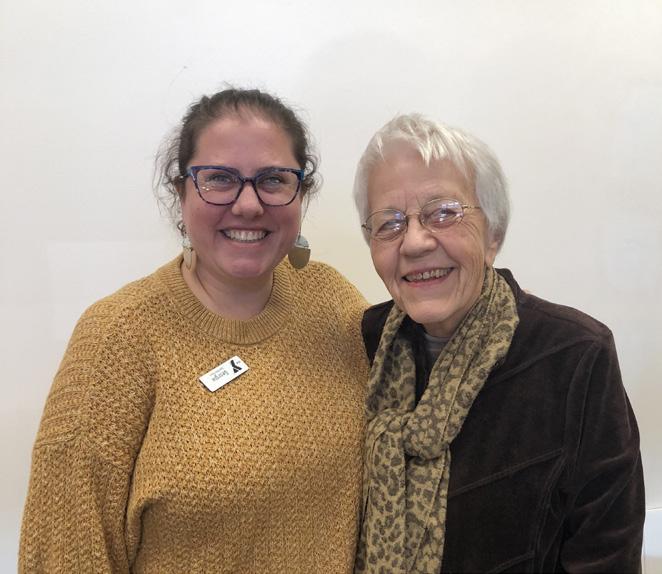
need to dot the “i’s” and cross the “t’s.’”
She wonders if that’s how this whole confusion about Icaghowan’s origin date happened in the first place, but nobody really knows the answer to that question.
After Marjorie retired, she put her attention to detail and love of history to use as a volunteer at the Kautz Family Library YMCA Archives at the University of Minnesota, which holds historical records for the national YMCA offices and the YMCA of the North, among other YMCAs . It was important to her that the archives were complete, accurate and thorough. During that time, she assisted with research for the publication of the book, “Breaking Ground, Building Strong Lives: 140 Years of Youth Work with the Minneapolis YMCA (1866-2006).”
Marjorie shared, “It was a fun project because I have some love for detective work in me.” She enjoyed looking through old records, and said, “that’s the stuff you need — that’s your history.”
While researching the book, sometime in the mid-2000’s, she came across a memo that listed the founding of YMCA Camp Icaghowan as 1908. But she remembered from working at the YMCA, that the camp letterhead listed the date as 1909.
2
us this summer to celebrate Camp Icaghowan’s
Join
116th Anniversary
about the
register to attend here.
Find details
event and
1
20

There is so much we let go in this world, but maybe we shouldn’t. If you are going to pound in a nail, pound it in straight. It will make it stronger.
She continued her research, finding additional documents that confirmed it: the founding date of Camp Icaghowan was 1908, not 1909!
Marjorie mentioned the date discrepancy to a few different people, but the Y’s focus at the time was on the publication of the book.
Foiled by circumstances beyond her control, she moved on to other projects, her research put aside, to be nearly forgotten.
Another attempt at resurfacing history
Years later, in 2019, former camper Mark Dobbelmann was helping to prepare camp for its 110th anniversary — still mistakenly believed to be in 2019. Mark, a camper at Icaghowan in 1961 with his own truly remarkable story, started helping with research on Icaghowan history. He was interested in learning more about the camp that had become so important to him because of both his daughter Laura and granddaughter Ruth’s love for camp. He was also curious if the research would help him remember anything about his time as a camper.
Mark visited the archives — the same ones where Marjorie had volunteered years before — scanning old photos, going through documents,
and eventually Mark assembled a bound book of information. In that process, like Marjorie, he discovered that the founding date of Icaghowan was not 1909, but actually 1908.
Michel Tigan was camp’s executive director at the time. As she was preparing for the 110th celebration, she and Mark discussed how to go about fixing the mistake.
But then, the pandemic struck.
Before Michel could fix the error, the entire team of Y Camping staff, including Michel, was thrown into a tailspin of crisis management, the cancellation of the 2020 season, and the subsequent re-structuring of programming to safely run in 2021. Amid all that, Michel became the executive director of YMCA Camp St. Croix, and shortly after, the Vice President of Adventure & Camp Operations. The box of photos, the research, and the information about the founding date was put on a shelf amidst the turmoil.
As before, the research was set aside, and the letterhead still read “1909.”
A responsibility to preserve camp culture
In late January 2023, Marjorie reentered the story. She read the first issue of “Letters From Camp,” and with her well-trained eye
for detail, saw every camp had its founding date. She checked Icaghowan’s and immediately saw “1909” in bold type.
She decided she would try one more time to get the error fixed.
Her e-mail landed in the inbox of Camp Icaghowan Executive Director, Georgia Wagner. Georgia talked with Michel and learned about all the work Mark Dobbelmann had done too.
“This matters,” replied Georgia. “It’s worth the time, energy, and resources.” Georgia brought the information to the Icaghowan Community Board, who also agreed that this was a detail that needed to be corrected.
Georgia and the board set out to plan camp’s 115th anniversary. It seemed like a fantastic opportunity to finally make the fix.
“This information has lit a fire in the community,” said Georgia.
The camp board responded by creating a preservation strategy to digitize records to care for this and other information. The date has been corrected on the website, in publications, on camp store merchandise, and staff will continue to edit the date where they find it listed incorrectly.
“We have a responsibility to preserve our camp culture,” said Georgia. “All of that has come from this project.”
You might even say, all of this has come because wonderful people like Marjorie and Mark cared to make a difference.
This summer Icaghowan will celebrate its — correctly described now — 116th anniversary. Alumni and friends will return to Icaghowan for
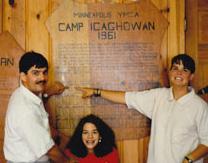
An Unexpected Reunion
Mark and Cathy Dobbelmann found the daughter they never knew. Laura Bestler found the parents who had given her in love to another family at birth. And they all discovered an entirely unexpected, mutual love of YMCA Camp Icaghowan.
Read the story online.
a day-long celebration with camp activities, archives on display and the official announcement of 1908 as the founding year.
When asked why this was important to her, Marjorie said, “What does a year difference matter? Well, it’s part of the truth of history. There is documentation to back it up and it should be known. There is so much we let go in this world, but maybe we shouldn’t. If you are going to pound in a nail, pound it in straight. It will make it stronger.”
1. Marjorie in 1963. 2. Icaghowan photos from Mark’s research.
3. Marjorie and Georgia meeting in 2023. 4. Mark Dobbelmann, Ruth and Laura at Camp Icaghowan.
3
4
21
LEARN MORE ABOUT CAMPICAGHOWAN
FOR THIS EXPLORER, WIDJI LED TO ‘THE MOST INTERESTING PLACES’
A camper with historic significance tells his remarkable story
Russel was eight years old when his mother told him he needed to stay in their yard while she was at work. But Russ was a curious kid, and he wanted to explore. He strayed from the yard, making it further and further away, each day embarking on a new adventure. He was a Boy Scout, a quick learner, confident, and resourceful. At 12 years old, when he saw someone on TV stick their hand out the window, thumb up, and get picked up by a car, he thought, “I have to do that!”
And so he did.
The intrepid hitchhiker was picked up by a passing trucker who drove Russel from his home in St. Paul’s Rondo neighborhood all the way to Winona, where he was dropped off on the side of the road. The year was 1962, and it was dusk. Luckily, as he walked along trying to figure out what to do, he was picked up by a family who took him to their home, called his mom, let him stay with them overnight, and drove him home the next day.
Shortly after that adventure, Russel’s mom signed him up for summer camp.
This is the story of Russel Balenger, a leader and a man of many adventures. Founder and director of the Circle of Peace Movement, Russel is a former city council member in St. Paul and a highly regarded community leader. Husband to Sarah, father, grandfather, and one of six siblings,
Russel also was quite probably YMCA Camp Widjiwagan’s first Black campers
Amidst a time of change
Around the time of Russel’s hitchhiking adventure, the civil rights movement was in full swing. In late August 1963, Dr. Martin Luther King Jr. would give his famous “I Have a Dream” speech at the Lincoln Memorial. The following summer of ’64, President Lyndon B. Johnson would sign the Civil Rights Act into law.
Camp Widjiwagan’s leaders sought to reinterpret camp’s mission in light of the civil rights movement. In 1963, the Committee of
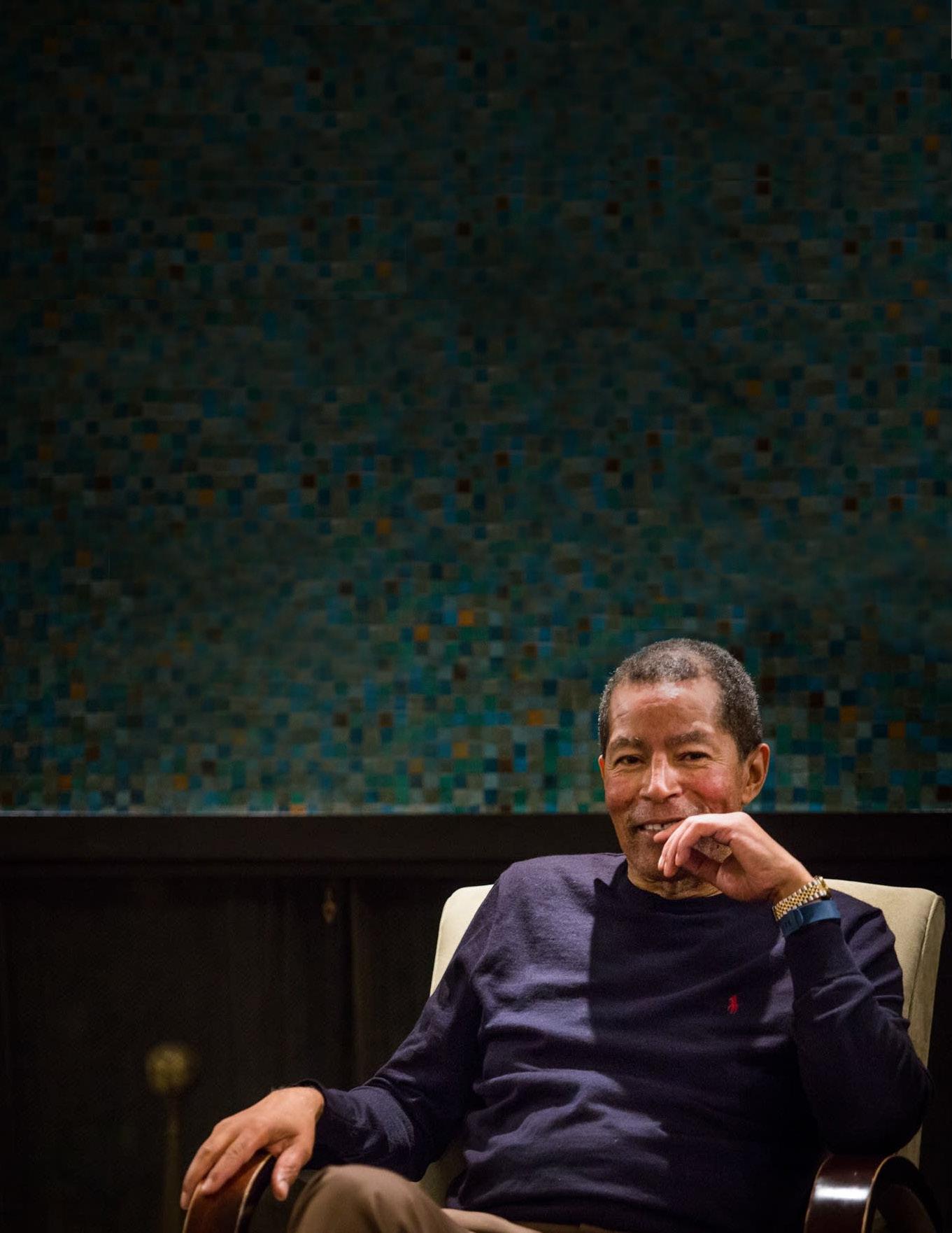
Management created a formal statement of purpose for camp:
“The purpose of Camp Widjiwagan is to help young people of all backgrounds to grow into responsible maturity by affording each camper the opportunity, in a setting of wilderness adventure, to gain a deeper understanding of himself and his relationship to God and his fellow man. And to have fun.”
This excerpt from “Widjiwagan, a History, From 1929 to 1989,” further describes the moment:
22

“During the more than 30 years of camp history which preceded [then-Camp Executive Director Armand Ball], there had never been an African American camper, staff member, or committee member. There had been no policy, formal or informal, which excluded African Americans, but neither had there been any effort to draw them into the Widji family. In the sixties, passivity was no longer an acceptable policy, and it fell to Armand to integrate Camp Widjiwagan.”
Leading the way
It was that same summer of 1963 when Russel Balenger boarded the bus for Widjiwagan, and while Armand Ball may have opened the door, it fell to Russel to blaze the trail. Years later, Ball (who served as camp director from 1962-74) would tell him that he had been the first Black camper to attend Widjiwagan, though this fact isn’t officially documented anywhere in the Widjiwagan history books. Russel was an outgoing kid who, despite being the only person of color at Widji, made friends easily. The other campers were interested in getting to know him and they quickly realized that he had a lot of skills as he established himself as a leader.
Russel shared a story from his second year at camp when he was 14 years old. Out somewhere in the Boundary Waters Canoe Area wilderness, one of the other campers in his group fell and hurt his back. The counselor had to evacuate that camper, and instead of canceling the whole group’s trip to return to camp, Russ convinced the counselor that he — Russel — would lead the group. He remembers the conversation going something like this: Russel: “Why don’t you meet us at this other spot on the map after you drop him off? It will take you two days to get to a phone, two days to drop him, and two days to paddle out here.”
Counselor: “Okay!”
Russel laughed as he recounted the story, “it’s amazing they let me do that, but I was confident even at that age.”
With the counselor gone, Russel and the others continued on the trail.
Russ recalls Wes, a smaller camper who stuck close to him, had devised a plan that if a bear were to come into camp, he would grab the hatchet and Russ was supposed to grab the knife — and then they would fight the bear.
But when a bear actually did come into camp after dark, with Wes yelling “The bear is here!” rather than fighting, Russ had the good sense to stay calm, grab the pots and pans and make a lot of noise to scare off the bear instead.
It goes without saying that Russel kept the group together, reuniting with the counselor on time on the sixth day and at exactly the spot they had planned.
One of his favorite memories was from that same trip when he had gotten ahead of everyone else in his group. “I stopped and laid down. It was calm and quiet. I looked up to see a Canada Jay on a branch overhead. I was watching it and thinking how beautiful it was when suddenly, an eagle swooped in and snatched it. It was shocking, and my heart was in my throat realizing how big and powerful the eagle was. A feather came down and landed on me — it was a magical moment in nature.”
From Widji to Russia and beyond
A few years later, while on another Widjiwagan trip, he learned about an exchange program with Russians from the United Socialist Soviet Republic. Russel came home from camp determined to go on that trip. He attended the information meetings, traveling around the city on his own to get to them wherever they were. He applied and was chosen, and then spent months raising money. The trip was over $4,000.
One day, seemingly out of the blue, his mom answered a phone call, turned to Russel, and told him: “You’ve got enough to go!” At the time, he didn’t know where it had come from, and he didn’t ask. Years later, he would hear the name of his mysterious benefactor — Judge Archie Gingold — and knew he had something to do with getting Russel both to Camp Widjiwagan and to the Russia trip.
I’ve had amazing experiences in my life. Widjiwagan changed everything. It put me into places all over the world.
During summer 1968, Russ and five other campers spent eight weeks traveling around Russia and Europe. It was a life-changing trip that, like the Widji trips before, gave him new perspectives, increased his confidence, and gave him the opportunity to develop into a leader.
He went on to be one of the first 50 students of color at Moorehead State. By the end of the first quarter of school,
...story continues on page 24
1
23
Camp Widjiwagan impacted my life in so many ways. It made me more of an explorer, and even now, so many years later, I still wander, and I find the most interesting places.
he was one of only 12 left. But after his experiences at Widjiwagan, he’d already experienced something similar and it helped him make friends and succeed, despite being in the minority.
Since college, Russel has continued to travel, continued to be curious, and has had a wide and meaningful career.
“I’ve had amazing experiences in my life. Widjiwagan changed everything. It put me into places all over the world.”
All points return to Widji
And as it has for so many alums, Widji has drawn him back to camp through relationships, sometimes in the most surprising ways.
In 1998, Russel’s daughter was eight
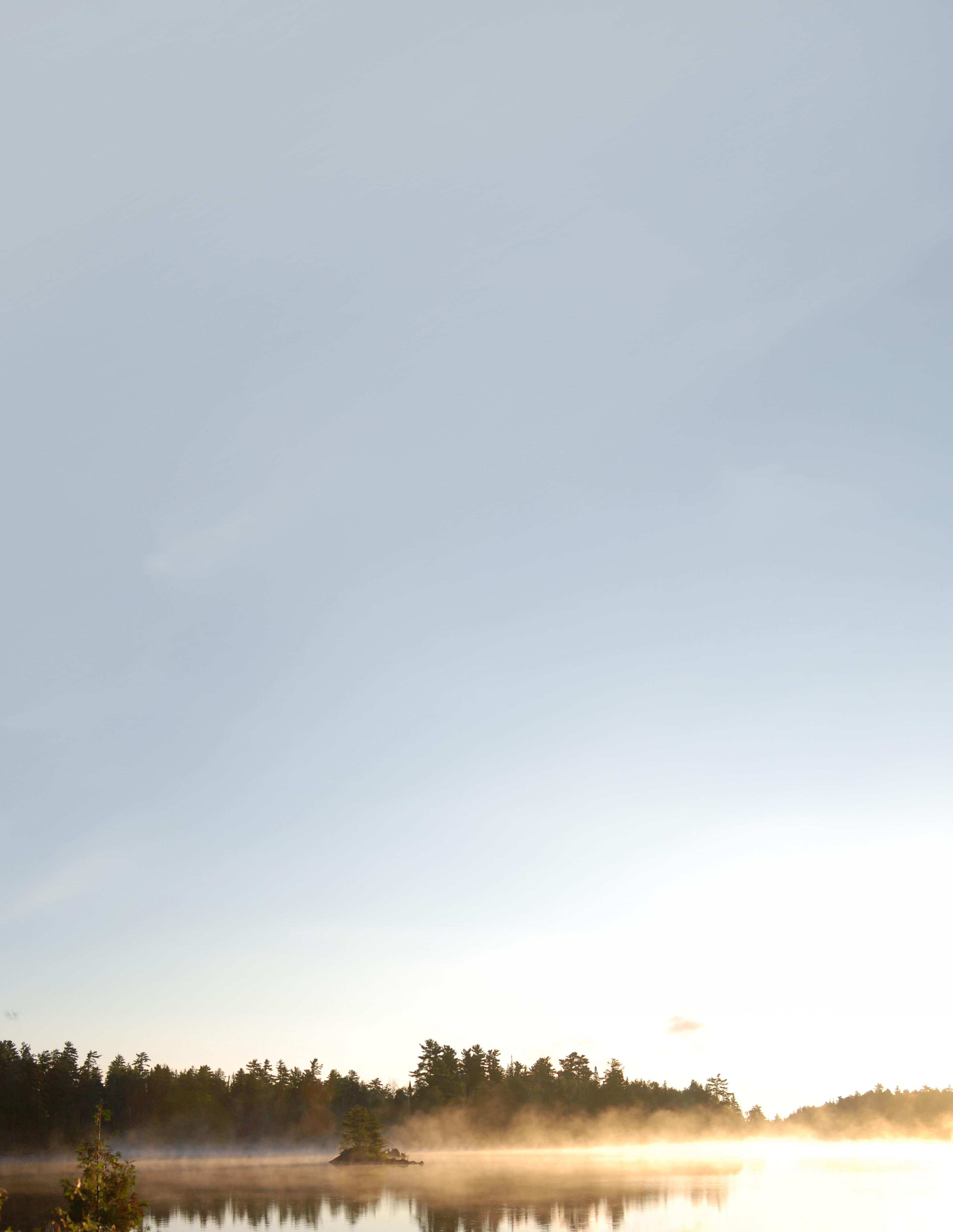
years old and broke her leg. While in the hospital, Russel overheard a conversation with a patient in the next room who turned out to be none other than his mysterious benefactor from all those years before: Judge Archie Gingold.
Russel introduced himself and thanked the judge for making Camp Widjiwagan and the Russia trip possible. It turns out, many years earlier, Russel’s mother, was involved with the North Central Voters League and made calls that contributed to Gingold’s election as a judge. He was happy to meet Russel and happy he’d been so positively affected by his experiences.
Current YMCA Camp Widjiwagan Executive Director Matt Poppleton
Russel said, “Camp Widjiwagan impacted my life in so many ways. It made me more of an explorer” and even now, so many years later, “I still wander, and I find the most interesting places.” Reflecting on his time at Widjiwagan, Russel remembered initially being shocked by the lack of diversity. His neighborhood, his school, and the people his parents socialized with were from different backgrounds and races. So, to be in an environment where he was the only person who wasn’t white was a new experience at that stage in his life.
Progress in diversity, equity, and inclusion at Widjiwagan has been made since Russel’s first trip to camp, but there is still much work to be done. Students from a variety of backgrounds and schools regularly attend Widjiwagan’s Outdoor Learning Program throughout the fall, winter and spring. The Bridge Program partners with those schools to connect youth to the Summer Tripping Program. Widjiwagan is also one of several camps that offer the BOLD & GOLD program that is an outdoor leadership development program that provides young people with a wilderness experience, partnered with an intentional curriculum on leadership development, cultural competency, and community building.
met Russel several years ago, when a mutual connection put the two of them in touch. When Matt and Russel spoke for the first time, Russel told him his Widjiwagan story, describing a lawyer from the Hallie Q. Brown Community Center, who went on to be a judge, had helped fund his way to camp.
Matt said, “I got chills, I about fell out of my chair. What a small world. He was describing my wife Kristen’s grandfather — Judge Archie Gingold. No one in the family was surprised when I shared that story. That’s how Archie was.”
“It was a special connection to make. What brought Russel and I together was his effort to find hiking boots for young boys in the Circle of Peace program. Russel had committed to leading hiking trips across the Twin Cities. I was inspired by his work of connecting youth of color to the outdoors. He then credited Widjiwagan as the source of his inspiration. It was a meeting of mutual admiration.”

LEARN MORE ABOUT CAMPWIDJIWAGAN
2
24
1. 1968 newspaper article about Russel’s Russia trip. Russel is pictured right, 2. Russel- 1968 yearbook photo.
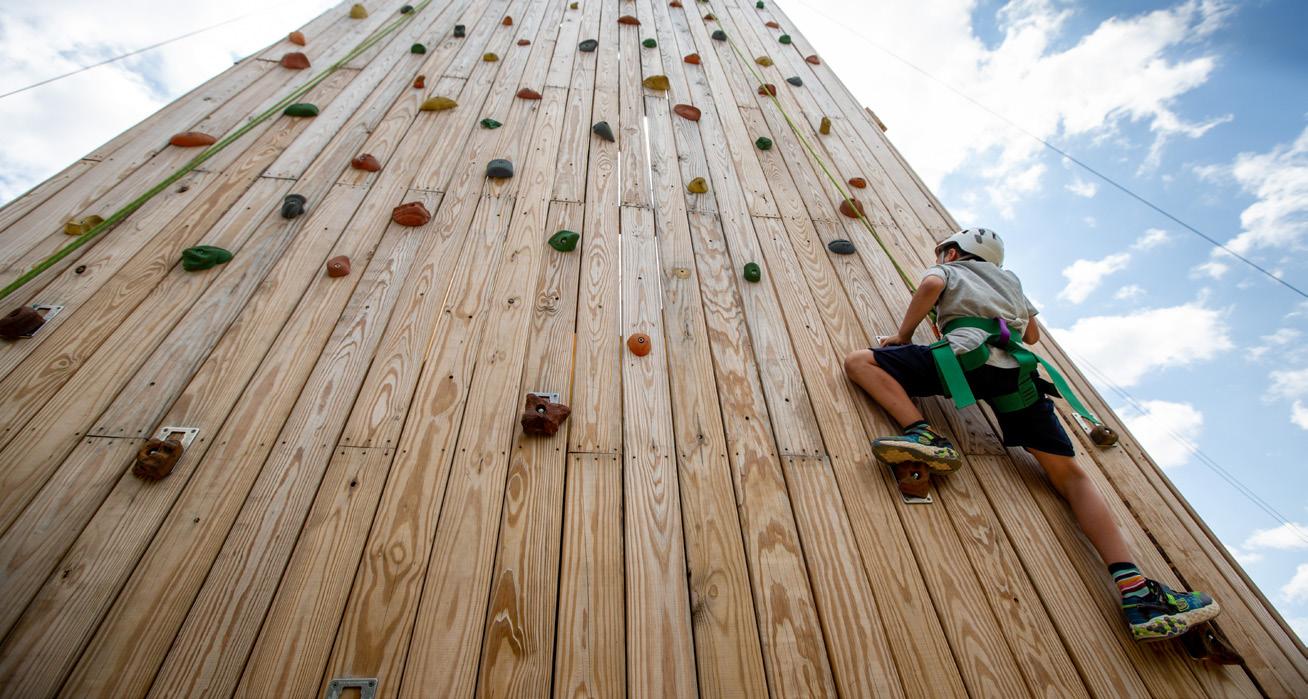
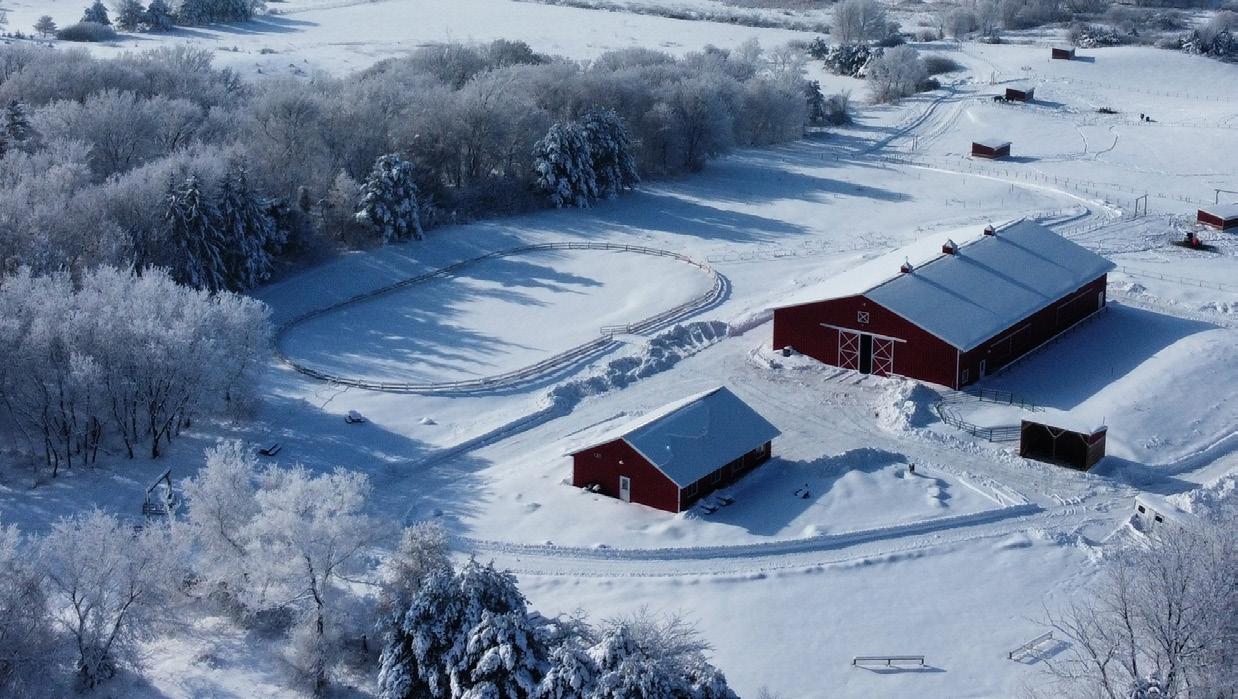
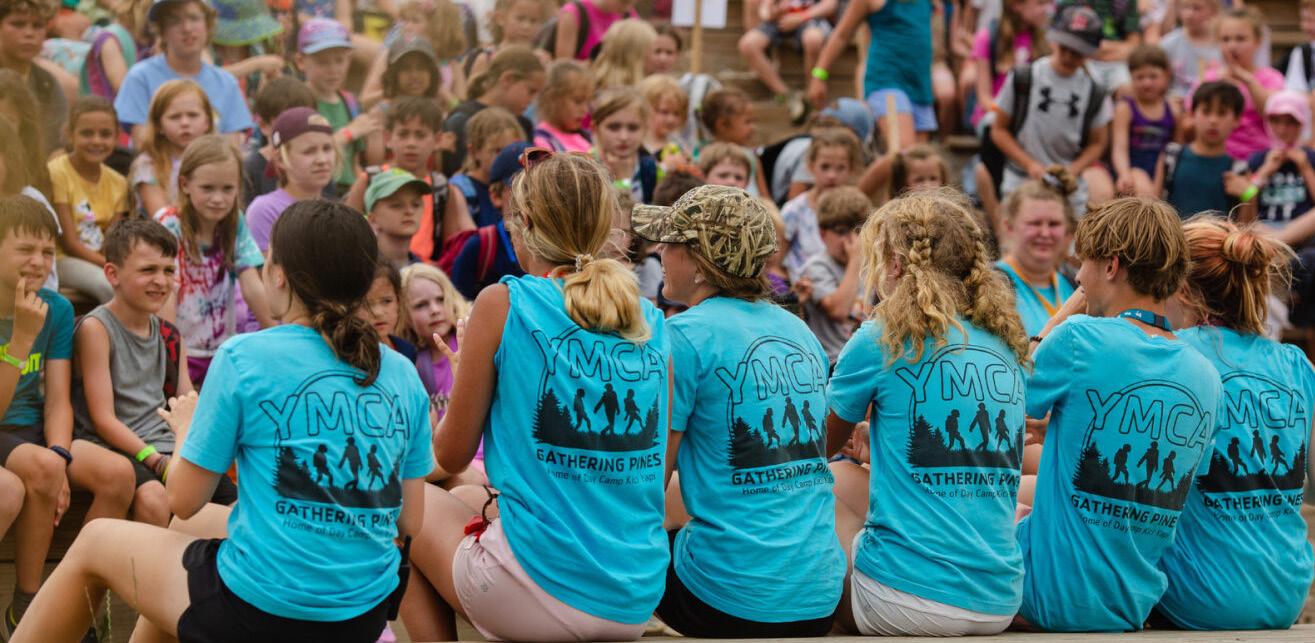
THE FIRST SUMMER OF GATHERING PINES
What’s your favorite camp tradition? Riding a horse for the first time? Building a fort in the woods? Swimming in a beautiful lake? Making a new best friend?
Camp traditions create cherished memories that last a lifetime. Each site has its own special experiences, so how do you build tradition as a new camp? Or, even more specifically, the newest YMCA camp: YMCA Gathering Pines.
Gathering Pines is new home of YMCA Day Camp Kici Yapi — now dubbed Day Camp Gathering Pines — which is located on Pike Lake Trail in Prior Lake and opened in the mid 1960s. Day Camp Kici Yapi was sold to the Shakopee Mdewakanton Sioux in 2011 with a long-term lease that allowed the camp to continue on-site until 2021.
That’s a lot of happy history for a new camp to try and replicate, while also establishing its own identity.
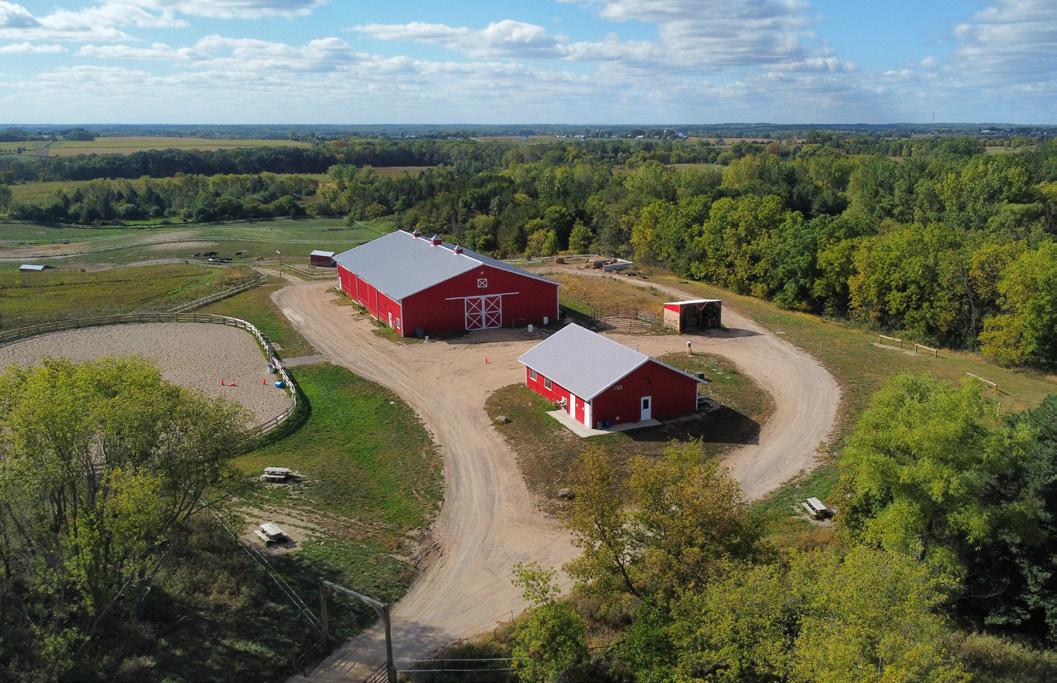
We have a whole story to tell you. Follow the QR code to read on.
lorem ipsum
FIND THE FULL, EXCLUSIVE STORY ONLINE! 1. Climbing wall at Gathering Pines 2. Gathering Pines from above in the winter. 3. Gathering Pines summer staff. 4. Gathering Pines horse barn. 1 2 3 4 25
THE SWEAT THAT BINDS US
Tales from the sauna at Camp du Nord
Before we get our story rolling, let’s get this out of the way. There’s only one way to say this word, and the Finlandia Foundation National offers a helpful explanation on its Web site:
“It is natural for Americans to pronounce it as saw-nuh, rhyming with fauna, but the word should really have an “ow” sound, as in sow-nuh. How, now, brown, sauna!”
Got it?
Like most things in this magazine, we begin with a first. In 1933 a group of Finnish carpenters arrived on Burnside Lake to build what would first become a privately run resort, and eventually, YMCA Camp du Nord. The first building they built was the sauna, which served as their bunkhouse as they constructed the cabins (did you say it right?).
When the YMCA of Greater Saint Paul purchased the property in 1960, its sauna was an important selling point, and early promotional materials touted the “Finnish bath” as a main attraction.
Camp du Nord’s history book, “All Nature Sings,” practically gushes about the sauna’s importance:
“Of all the traditions at Camp du Nord
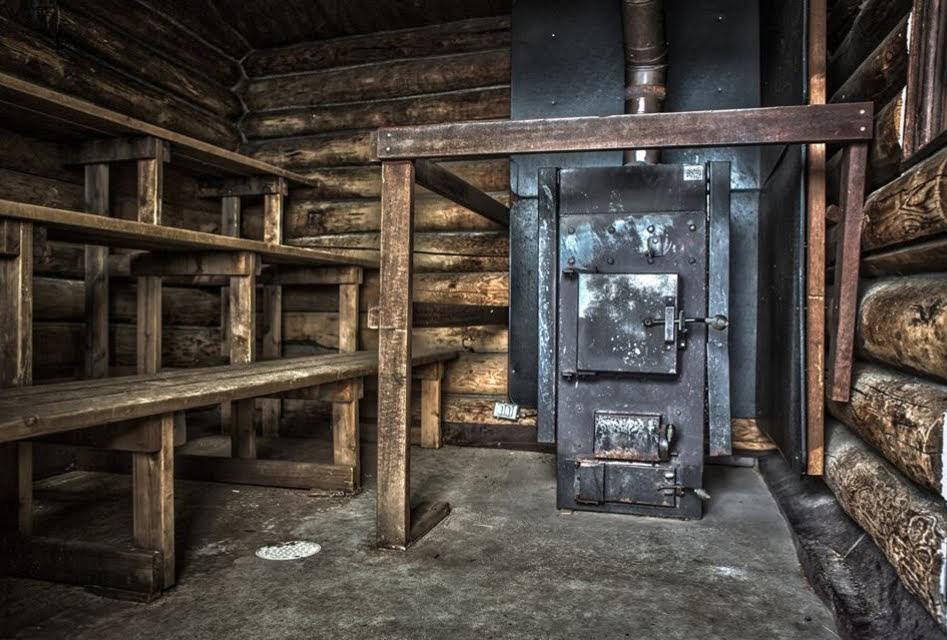
— and there are many — none dates back as far as the time-honored ritual of the sauna. For many campers, it is camp’s centerpiece.” Today that’s not even close to an overstatement. This little building, and the “sauna culture” it promotes, is perhaps the most universal touchpoint du Nord has to offer.
So just what’s the big deal about sweating in a hot room?
Some say it’s the smell – woodsmoke baked into the sauna’s timbers and benches, flavored with aromas of birch and white pine.
Others cite the peaceful embrace of the hot darkness, or the relationships — built drop by sweated drop. There is camaraderie there, and a rugged individualism too.
For some, it’s the sudden immersion in the cool waters of Burntside — or even avantouinti — a Finnish word for ice hole swimming, the more extreme, icy wintertime option some du Norders love best. Many sauna lovers extol its health virtues, or laud the enchanting view, whether of Burntsides’ clear waters and forested shoreline or fields of blazing stars over a snowy icescape.
As you can surmise, sauna-ing happens
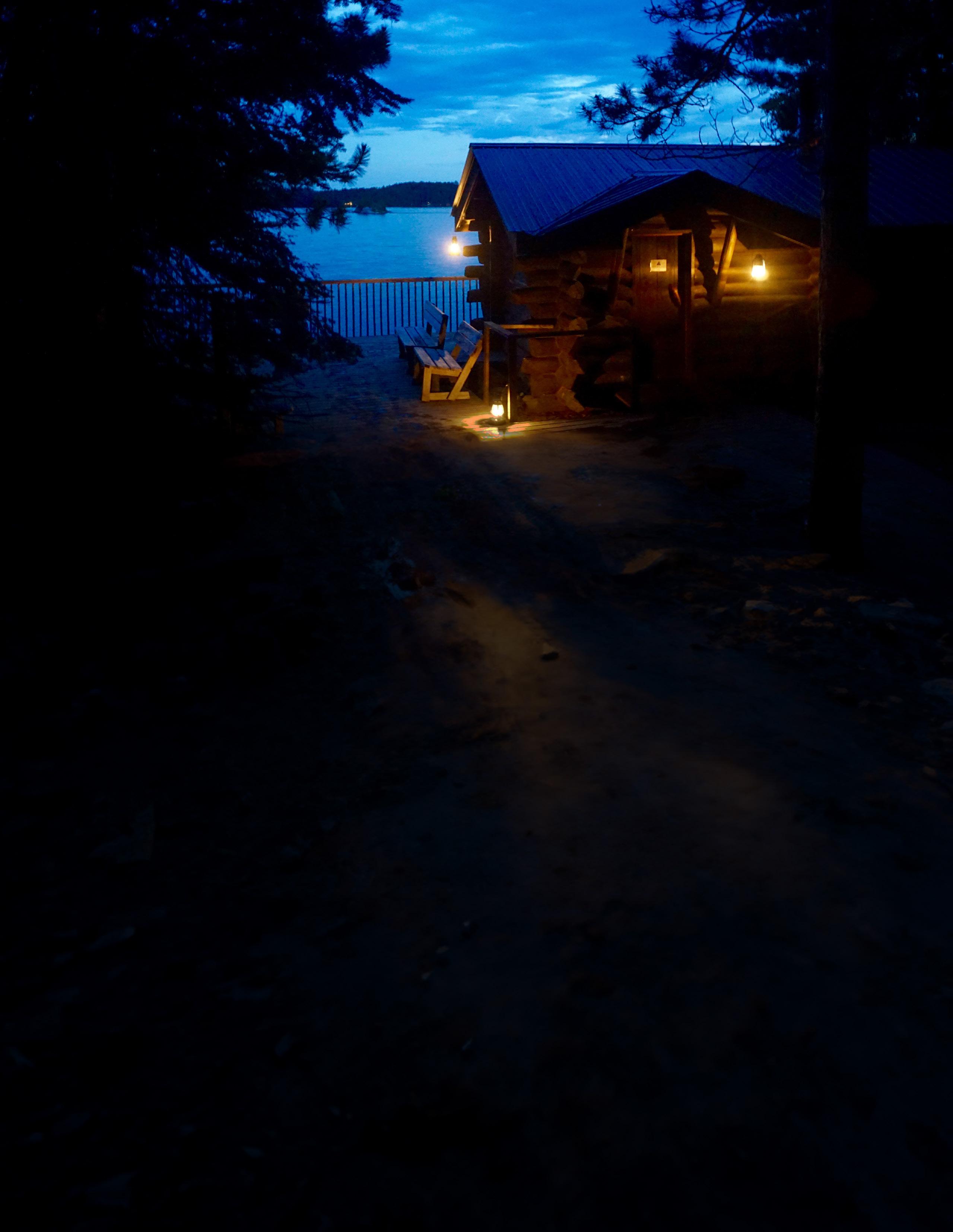
year-round and at all times of the day or night. And you can do it to your tastewhether you are a night owl who enjoys cooling off under the stars or if you prefer to go first thing in the morning. Sauna sessions can be single gender and during those times, some people choose to leave all their clothes behind. There are times set aside for a slightly cooler sauna temperature, allowing families to sauna together in an all-ages session. Some people prefer quiet sauna time, enjoying the solitude with small groups with nary a word spoken. For many, it’s a time to “sweat out the toxins and everything else.” These folks swear the best sleep comes after a sauna.
The sauna is a uniter, a place where people with diverse stories, backgrounds, and loves come together to spend time in almost every element and condition the Northwoods has to offer.
Tales from the bench
Camp du Nord Executive Director Andy Sinykin claims he is “never more relaxed than after a sauna.”
Du Nord alum Danny Baldus-Strauss described the sauna: “For me, it’s the place I feel the most amount of solitude, but also feel the most community. When I think of
Inside the sauna at camp du Nord.
26
du Nord sauna at night
the sauna, I think of the late nights with just a few guys, a lantern flickering, the smell of the wood, the quiet. The water is so still and calm and you are under the stars. It’s the people together, sharing the experience, it’s a community.”
Danny grew up attending du Nord with his family in the late 1990s, joined the Leadership Development Program, and after a few summers away, returned to summer staff from 2009-13. His favorite spot at camp was the sauna, especially the 10p.m. to midnight men’s sauna time, where he would take his guitar and spend time relaxing, chatting, connecting, and reflecting.
Community, fitness, the feeling of being at camp. These things came together, and he founded his company Sauna Camp. Sauna Camp launched in the winter of 2023 with a goal of “fostering a sense of togetherness, creating an environment where the spirit of adventure and relaxation intertwine outside in nature.” Describing his business, Danny said, “We take our physical and mental health seriously, and think community plays an important role in both.”
One reason the sauna culture has always flourished in Finland has been because of the versatility of the sauna. When people were moving, the first thing they did was to build a sauna. Finns have used the sauna to live in, eat, address matters of hygiene, and give birth in an almost sterile environment.
- Wikipedia
Dan Morlock, du Nord camper and staff alum also described the sauna as a place of community. He has fond memories “sitting with people you don’t know, talking, telling jokes, jumping in the water to cool off, looking at the stars. Relaxing.”
One of his favorite times to sauna is in the winter. For those who haven’t experienced winter sauna-ing, there are a few things to know: you need to wear wool socks so your feet don’t stick to the ice. To cool down you can either roll around in the snow or you can jump into a hole in the ice, and despite
freezing cold temperatures, when you get out of the sauna, you will be able to stand outside comfortably because your body is so warm.
Keely Young-Dixon, du Nord alum and current board member describes it best, “It must be something about the vulnerability of sitting in a dark room full of strangers or doing something new, different, or a little scary (there is the supposed snapping turtle lurking in the dark water after all, and the water temperature even in early June is no joke), that gives people the confidence to let their guard down. I always leave the sauna feeling a lovely warm glow, but also feeling like I was a part of a somewhat magical community. I won’t recognize faces in the daylight, but I somehow feel closer to those I sat, sweating, shoulder to shoulder with, marveled over the moon reflecting on the water as we swam, and learned about life from. This community aspect is what sets the du Nord sauna experience apart from any other. You can sauna in many different places, but I have yet to find one that involves such a strong feeling of community.”
Ready to step inside?
There is a reverence for the sauna, almost spiritual the way that people speak of their experience. Described as “peaceful, tranquil, relaxing, quiet, slow, comfortable, a release, cleansing, a place for connection.”
There is another Finnish word — sisu, which means fortitude and grit. For Danny, this is the best description of what it means to sauna.
Danny shared, “there’s no right or wrong way to sauna. Come to it with an open heart, an open mind, and ready to connect with your breath. There’s no competition. Do what feels right for your body. Don’t be intimidated.”
No indeed. Be welcome. Come and enjoy.

Ihduhapi
Icaghowan
Warren
St. Croix
du Nord
Northern Lights
Widjiwagan
Menogyn
of Saunas
Sauna Type(s) 1 1 1 0 3 2 1 1 Wood burning Electric Wood burning N/A 1 wood burning, 1 electric, 1 both 1 wood burning, 1 electric Wood burning Wood burning
No.
Camp
27
LEARN MORE ABOUT CAMP DU NORD
LETTERS FROM ALUMNI
Katy (Urbanski) Hargis
Camp Menogyn
Looking at a 1978 photo of herself carrying a canoe for a mile for the first time, she remembers thinking “If I can do this, I can do anything.” She has carried that feeling of empowerment with her for over 40 years. Also with her since her time as a camper at YMCA Camp Menogyn — lifelong friends.
The ‘78 femmes group have stayed in touch, exchanging letters and periodic reunions. Watching each other grow and evolve over the
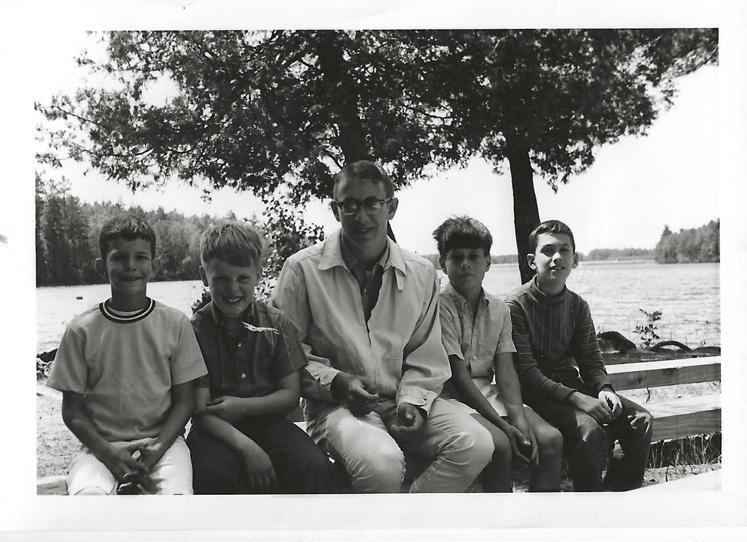
John Bachman
Camp Warren
Going through old boxes while preparing for a move 2 years ago, John Bachman came across a pile of old letters. These were letters written by him, sent to his then-girlfriend, now-wife, from when he was a YMCA Camp Warren counselor in 1971.
John was on staff from 1967-75 working as a counselor in Cub 7 and Cub 8, as well as section head during the special session. In one of his letters, he wrote about a camper falling and breaking his arm.
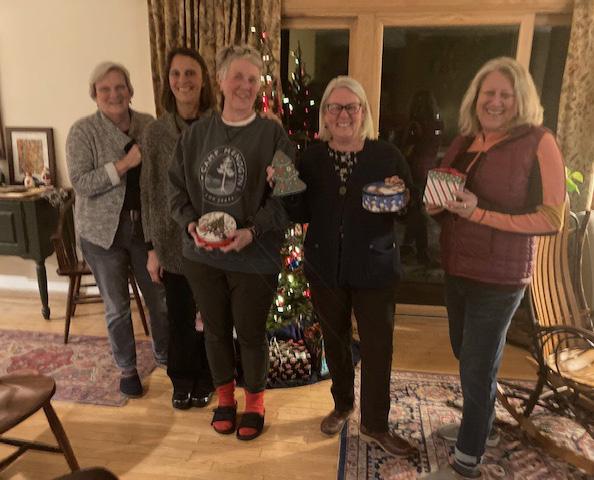
years has been special and Katy said that having these relationships has changed her life.
Katy not only has the Femmes group she keeps in touch with, she is also part of another group of Menogyn alum who gather each year for an annual cookie exchange. This gathering has been happening for over 30 years now. “Anne always hosts and she always makes scotcharoos. We won’t let her make anything else!”
For Katy, Menogyn is special because of the relationships she’s made. “Strong women, strong role models, lifelong friends who have changed my life.”

WHAT’S NEW WITH YOU?
SHARE YOUR STORY!
The YMCA camp community and connections within it are special. We do our best to keep alumni data current and correct so that when milestone anniversaries approach, or exciting camp updates arise — you’re the first to know.

“I ran over there, and sure enough, his arm had an extra bend in it. I immediately put on my super-doctor act and splinted his arm with some rolled magazines and a belt. (Forty-five seconds to apply the splint and two minutes to think about what a great job it was.) I then took him to the hospital, where I watched him get x-rays (two bones in the forearm broken). I then watched the arm being set with a crunch and then an application of a cast. I really think that I can do that someday. This morning, the boy was OK and said he would stay in camp with his broken arm. I must admit the entire staff thought I did an A-OK job.”
After eight summers on staff, he entered medical school, married his wife Joan in 1976 and then spent the next 40 years working as a family doctor at the Mayo Clinic where he says he set a lot of bones!
Now retired, John is a volunteer at YMCA Camp Ihduhapi, assisting with the standing orders for the health center.
If you’re willing to share a memory or tale of your time at camp, or tell us what you are up now, we’d like to hear from you! Excerpts from your story might be shared in future magazines or on our website.
ymcanorth.org/adventure/alumni
Or, contact Director of Alumni Philanthropy
Natalie King at natalie.king@ ymcanorth.org
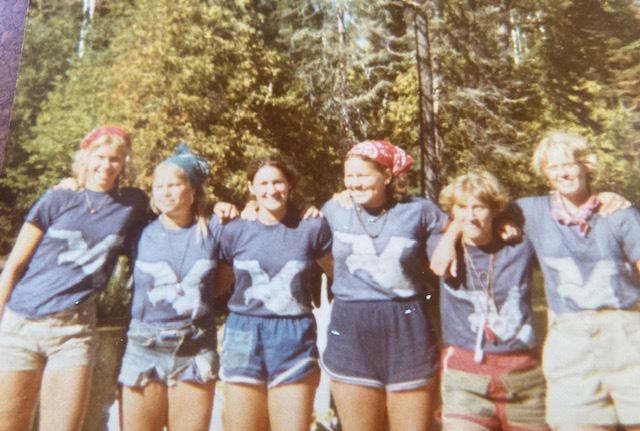
2 4 1
3 28
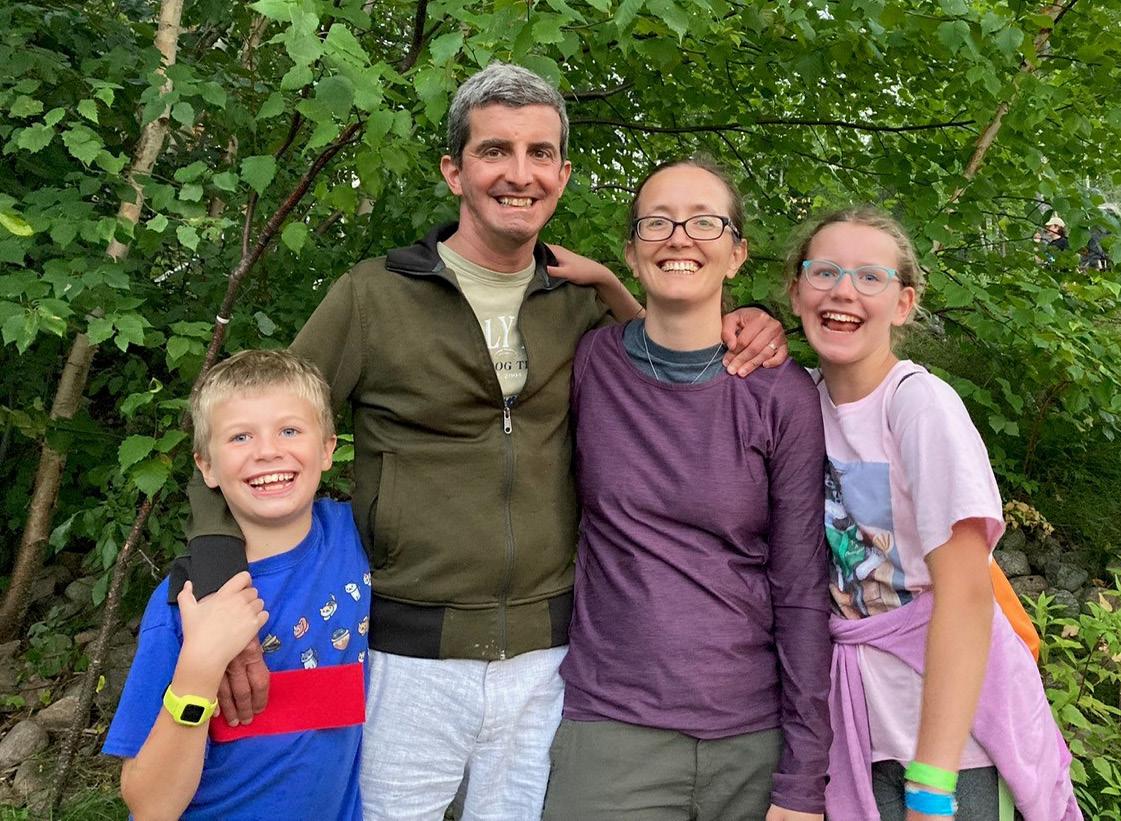 Anne Valaas-Turner
Anne Valaas-Turner
Camp Northern Lights
Anne Valaas-Turner and her family have been attending YMCA Camp Northern Lights since 2020. During their first summer programming was altered due to the pandemic, there weren’t age groups or large group activities, but since they were new to camp, they didn’t notice a difference. They loved the opportunity to disconnect and spend time together as a family and they’ve been back every summer since. Her daughter Penelope met one of her closest friends in age groups, and it’s been fun to watch her son Otto grow in confidence each year.
In addition to going to camp every summer, the Valaas-Turner family also loves to go to CNL in the winter. Anne explained that in the summer, there are so many activities and such high energy. But in the winter, it is a much quieter and a great time to relax as a family, slow down, go skiing, and hang out together.
Anne and her husband Colin have been early supporters of the Be the Light capital campaign because they believe in paying it forward. “Our family has benefited from our involvement in camp, and we would like to see CNL survive and thrive and continue to be a place where people can go and make families stronger.”
1. John and his group in 1964: do you recognize yourself in the photo? Let us know! 2. Cookie exchange group: Kathy Marker Truax, Lisa Turner, Sue Householder, Ann Carlson, Katy Urbanski-Hargis, 3. 1978 femmes group in 2023- Charlotte, Rinda, Rachel, Karen, Katy, Ann. 4. Charlotte Nelson, KarenNyhus(guide),RachelBreen,Ann Palmer, Katy Urbanski, Rinda Bartley. 5. Otto, Colin, Anne and Penelope at camp. 6. John Shepard and family at Camp Du Nord, 7. The Johnsonfamilyonacanoetrip(LtoR:Lindsey (holdingAmelia),Andrew,Cori,Christopher, Frank and Meredith.
John Shepard Camp du Nord
In 2022, John Shepard followed his then 2-year-old grandchild who was running down the du Nord path yelling, “I’m free!” That was the first year for John as a camp grandparent, but his long history with Y camping started when he became a counselor at Camp Widjiwagan in 1974. He quickly moved up to program director and also worked during offseason programming until 1981. When the YMCA purchased Camp Northland (now part of Camp du Nord), he served as director for a short time and then worked for the YMCA in Shoreview.

John, his wife Suzanne, and their 2 kids served as a du Nord Resource Family for 13 years, from 1990 to 2003. He and his family have many great memories from years at camp. John remembers an overnight canoe trip with a group of 12-15 people. The weather was hot and humid, and just as they got to the campsite, the thunder and lightning started. The storm was so intense it sounded like a freight train. It was a sleepless, terrifying night ... for the parents. The kids, who were in a large tent all together were singing, completely oblivious to the danger.
John and his family continue to be involved with Camp du Nord as campers, donors, and volunteers. Being at camp is “a renewal experience. The quiet lake, pine trees, hiking, share activities with family — refreshing.”

Meredith Johnson Camp Widjiwagan
Meredith’s first year as a camper at YMCA Camp Widjiwagan was in 1969. She was 12 years old. She would return for the next six summers as a camper and then spend 10 years on staff. She met her husband Frank in 1975, which was the first year she was on staff and his final year of the seven he spent working at Widji.
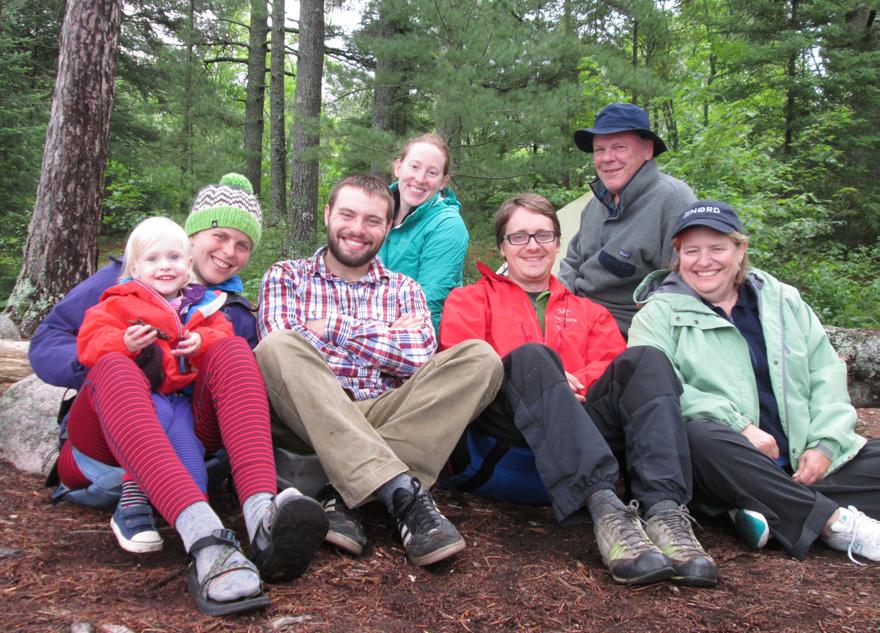
Widjiwagan changed her life, teaching her that she could make friends and be anyone she wanted to be. She grew in confidence and self-assuredness.
Her three children — Christopher, Andrew and Lindsey all attended and served on staff at Widjiwagan, and Lindsey also worked at du Nord. Meredith shared that Christopher started going to camp in 1996 and it began 21 years straight that someone was always at camp.
Five years ago, her family started attending YMCA Camp du Nord, including her 2 granddaughters. She says it is the best thing they do as a family every year.

5 6 7 29
LETTER FROM THE VICE PRESIDENT OF ADVENTURE
I was seven years old in the summer of 1985. My working parents signed me up for day camp at Camp St. Croix. I was full of anticipation and nervous energy, thinking about an adventure beyond my Pound Puppies and Cabbage Patch Dolls. I was the youngest, by quite a few years, and since my siblings hadn’t gone to camp, I was going to experience something new for my family. I was going to pave the path! I remember the pride I felt in going it alone, no friends or classmates, no big brother or sister, just me.
When the day finally came, I was ready. The nervous energy gave way to pure excitement, and with my jelly shoes firmly plastered to my feet, neon Speedo swimsuit and lunch in my backpack I was intent on embarking on my adventure. What followed was games, crafts, new friends, a few blisters from the jelly shoes (I learned quickly they were the wrong shoe choice), and confidence. That confidence is what carries through my memories from day camp to overnight, and finally wilderness camp. As I have looked back at my diaries from that time, I was lit up inside by the strength I found in doing something for me. From my first time to my last time,
I found ways to shine my truest self at camp because of the confidence and selfassurance the experience creates.
When years later, I stood in front of a room of young, freshly hired summer staff as the leadership development director at Croix, a capstone position I was driven to achieve from the first moment I stepped on staff, and sang “I Will Survive” at the top of my lungs, I meant it as a call to action. The call: that each staff would inspire the next generation to know what they are truly capable of, and to believe the same for themselves. I wanted these new staff to know what I learned, that very first summer in 1985 — we can survive, we can find joy in new experiences, and we can grow from doing hard, independent things. In fact, it’s the best way to come to know yourself.
WE WANT TO HEAR YOUR FEEDBACK!
This is “Letters from Camp’s” third edition and we are working hard to put out the best magazine possible. How did we do? What else do you want to see? Help us improve by giving us your suggestions.
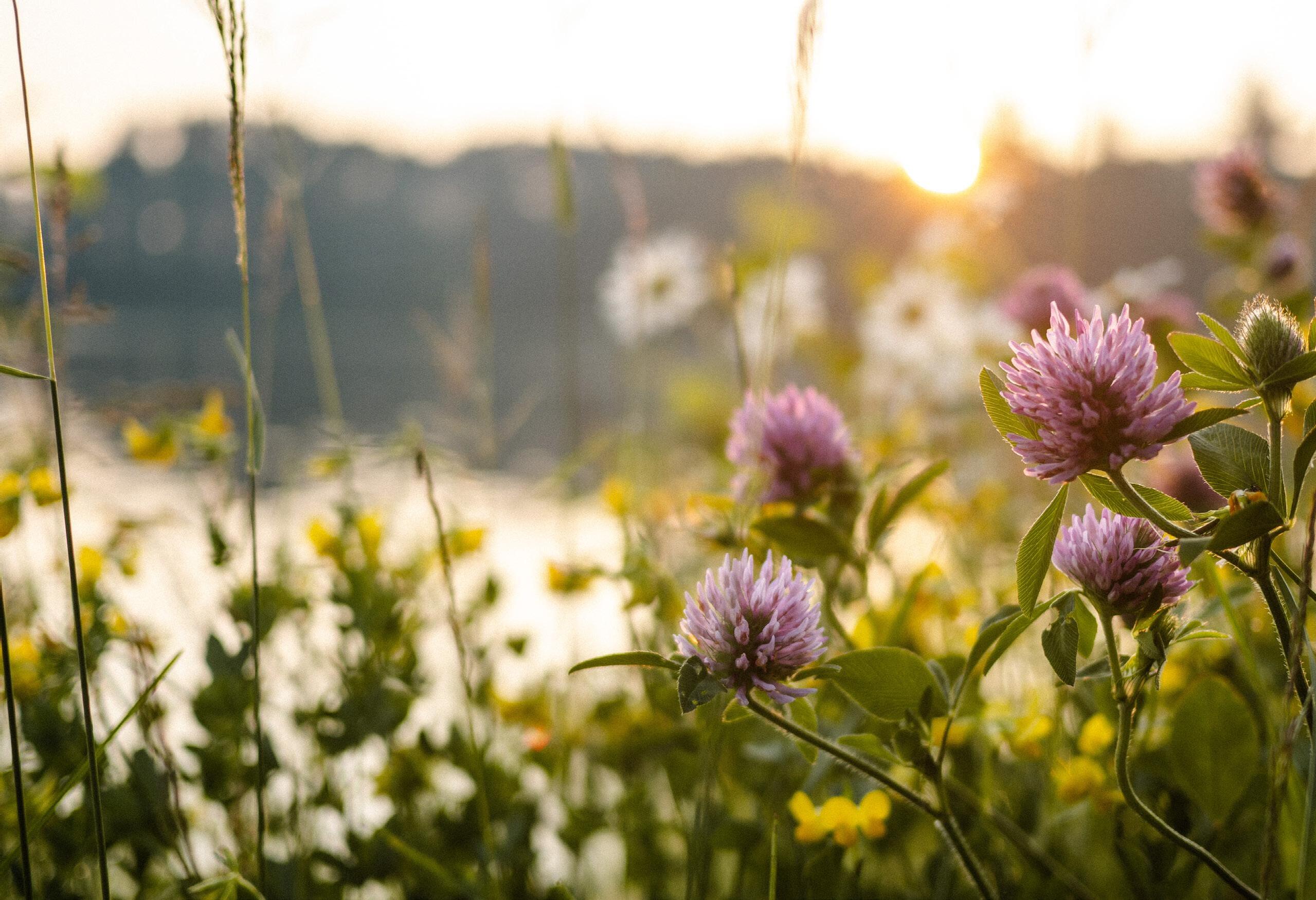
Michel Tigan
MICHEL TIGAN
Vice President of Adventure and Camp Operations

ymcanorth.org/adventure LettertotheEditor@ymcanorth.org or contact Director of Alumni Philanthropy Natalie King at natalie.king@ymcanorth.org
30
MANY HANDS MAKE LIGHT WORK
Generosity comes in many shapes and sizes, with each contribution working together in unison to nourish the greater good. For decades, campers, alumni, staff, volunteers, parents, and friends have helped to shape our legacy and uphold our traditions, by giving what they can — when they can.
ANNUAL SUPPORT
By providing these critical dollars throughout the year to the Annual Fund, you become our advocate in supporting access to adventure, a once-in-a-lifetime experience, and a continued shared legacy.
VOLUNTEERISM
Dedication to service has always been at the heart of our camping ethos. Join us for a work weekend, bus send-off, or become a camp board member so you can see first-hand how we pass our sacred traditions down from generation to generation.
CAPITAL IMPROVEMENT
Mother Nature is responsible for the beauty of our camps. As the years pass, often times we need to maintain or enhance our facilities to continue the exceptional experience we’re committed to delivering every single year.
ENDOWMENTS
The vision to financially sustain our camps is vital to YMCA growth so we can continue our journey of being the No.1 provider of outdoor adventure for many more decades to come.
CAN WE COUNT ON YOU TO LEND A HAND?
No one knows the value of the camp experience more than our alumni and friends. We count on each and every one of you to make the MAGIC happen every year. Thank you for believing in us and being our partner.
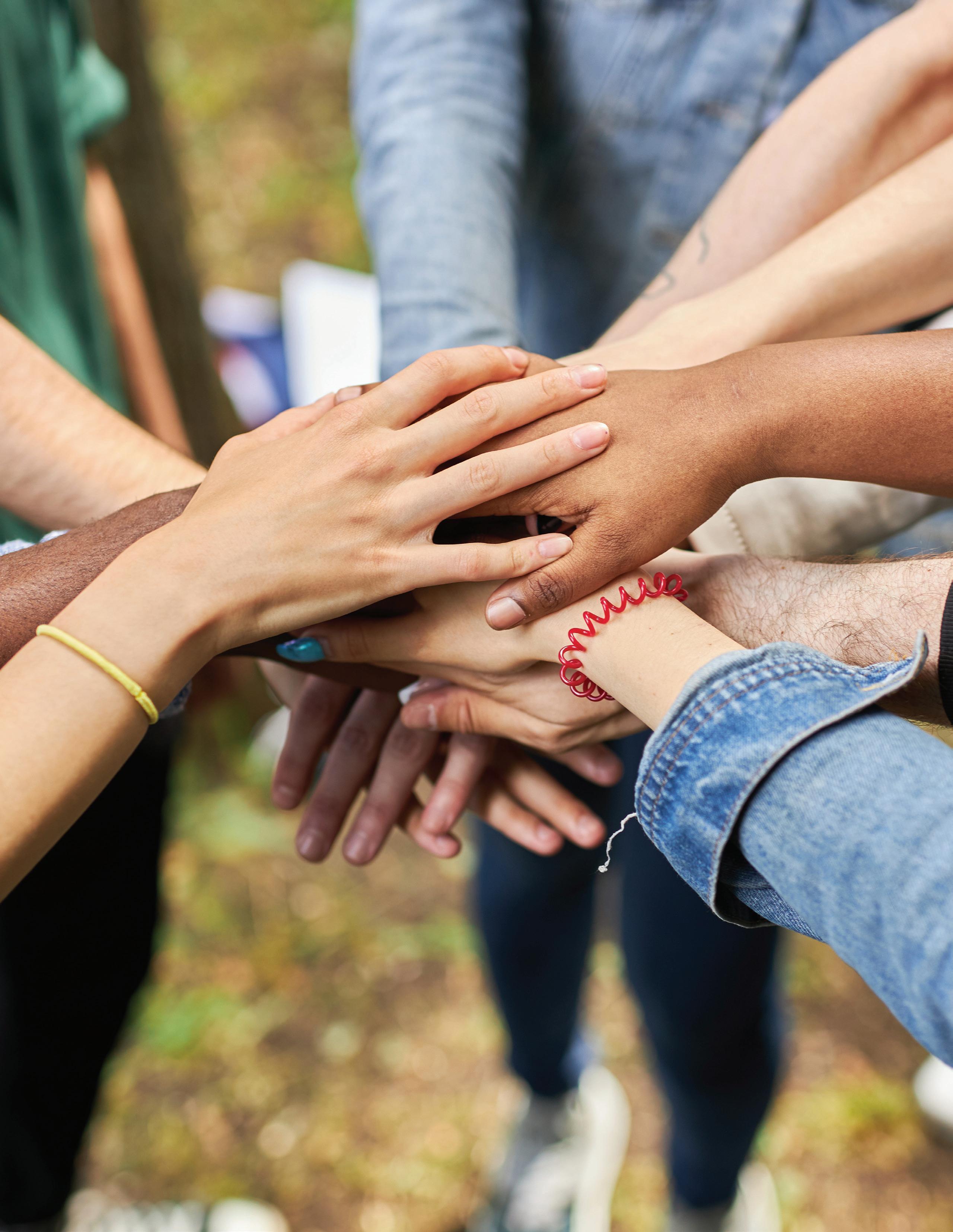
GIVE WITH US
ymcanorth.org/give
31
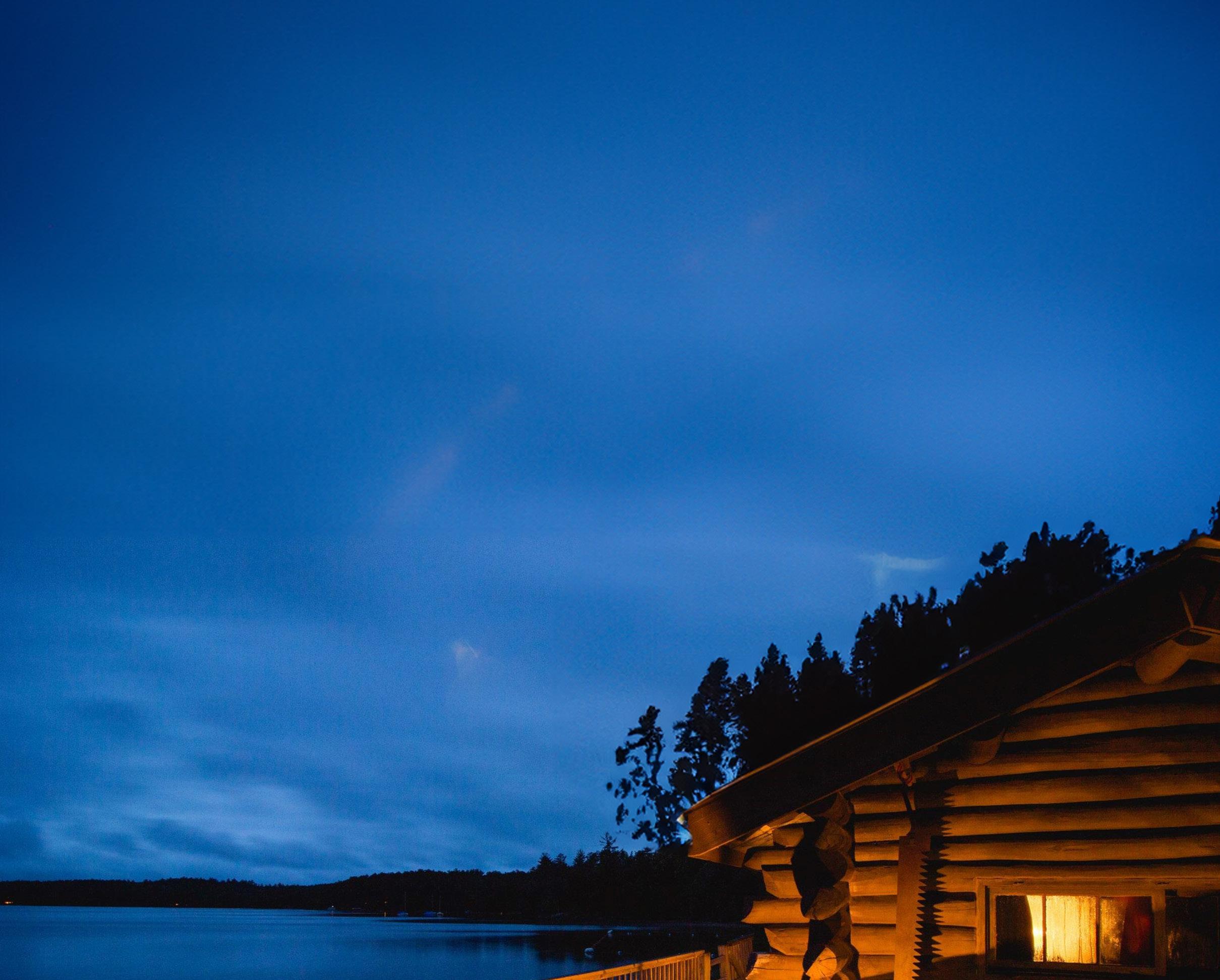

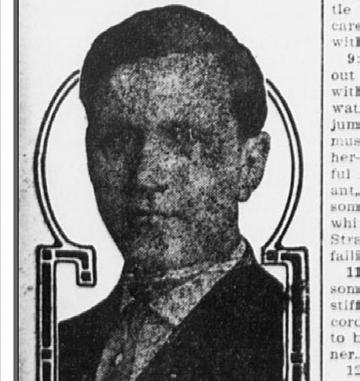
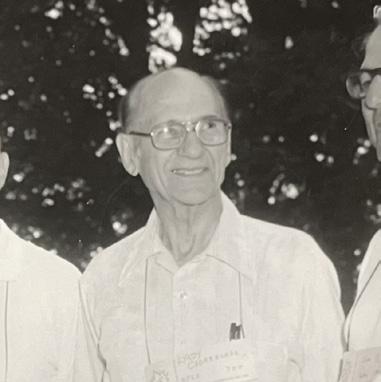
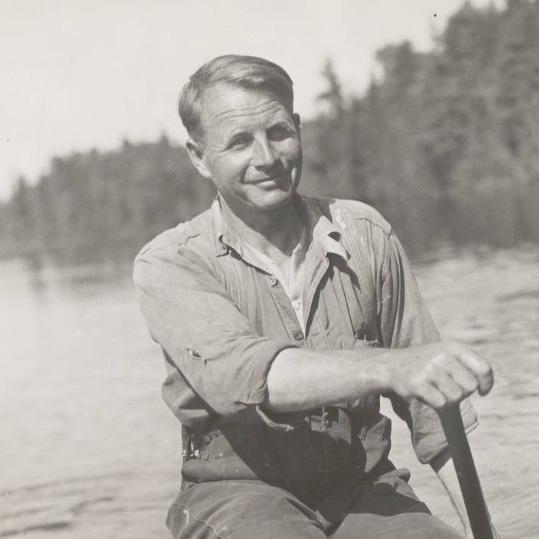


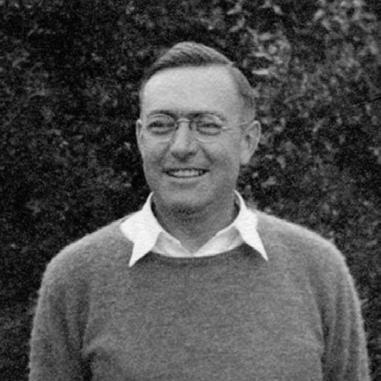
THE FIRST DIRECTORS
Croix Frederick Shoemaker 1932-39
O.R. Tripp 1921-30
Lyndy Cedarblade 1932-37
Bill Parker 1929-62
Nord Armin “Whitey” Luehrs 1961-66
W.G. Cartlich 1908-11
Lights Niki Geisler 2018-21 NONPROFIT ORG. US POSTAGE PAID TWIN CITIES, MN PERMIT NO. 3151 CAMPING & ADVENTURE 651 Nicollet Mall, Suite 500 Minneapolis, MN 55402 VISIT OUR ALUMNI WEBSITE
Wallace Clark 1931-33 ? Where’s Wallace? We have yet to find a photo of Wallace Clark. Can you help us solve the mystery?
St.
Menogyn
Ihduhapi
Warren
du
Icaghowan
Northern
Widjiwagan






















































































 Anne Valaas-Turner
Anne Valaas-Turner














